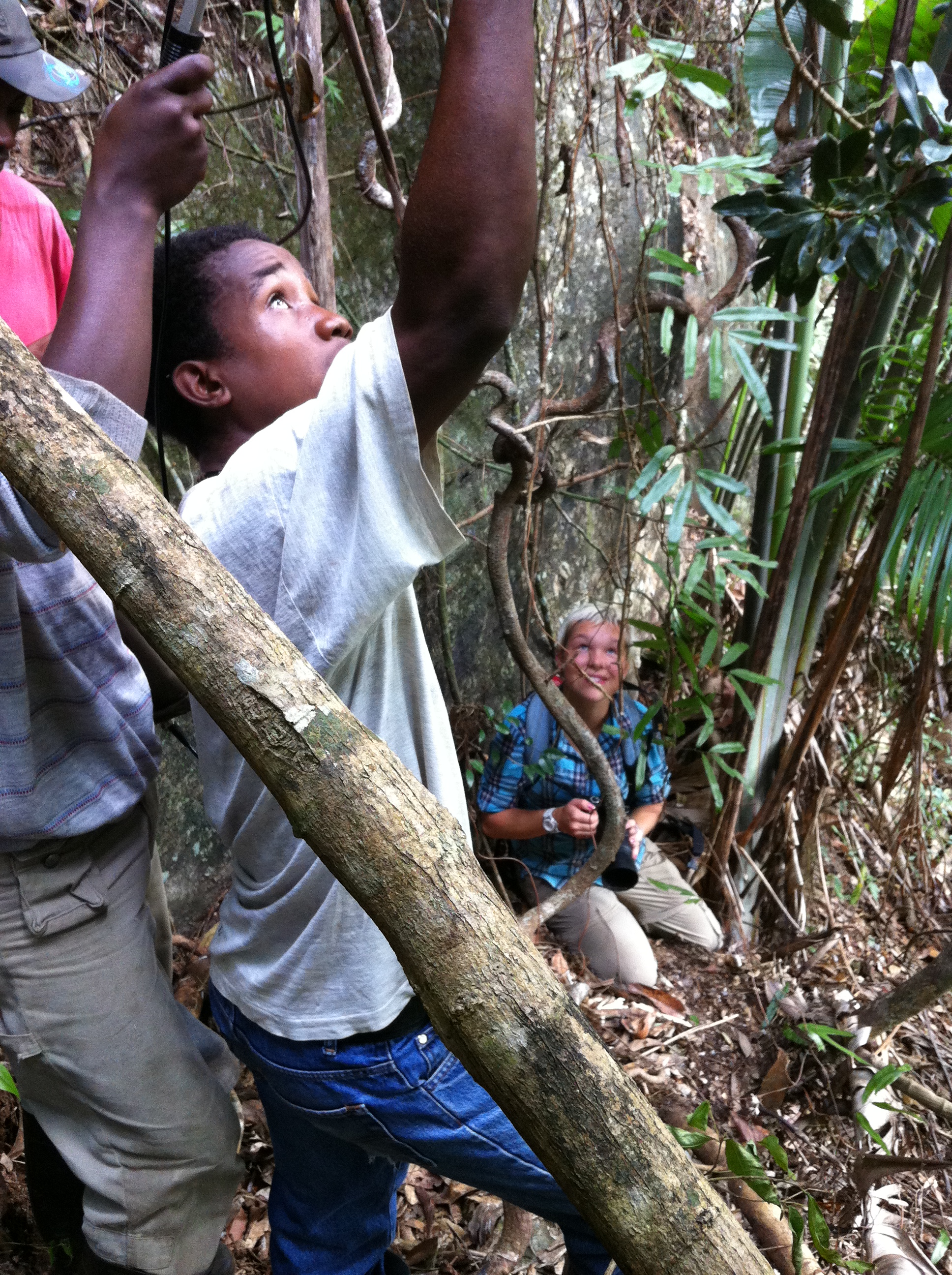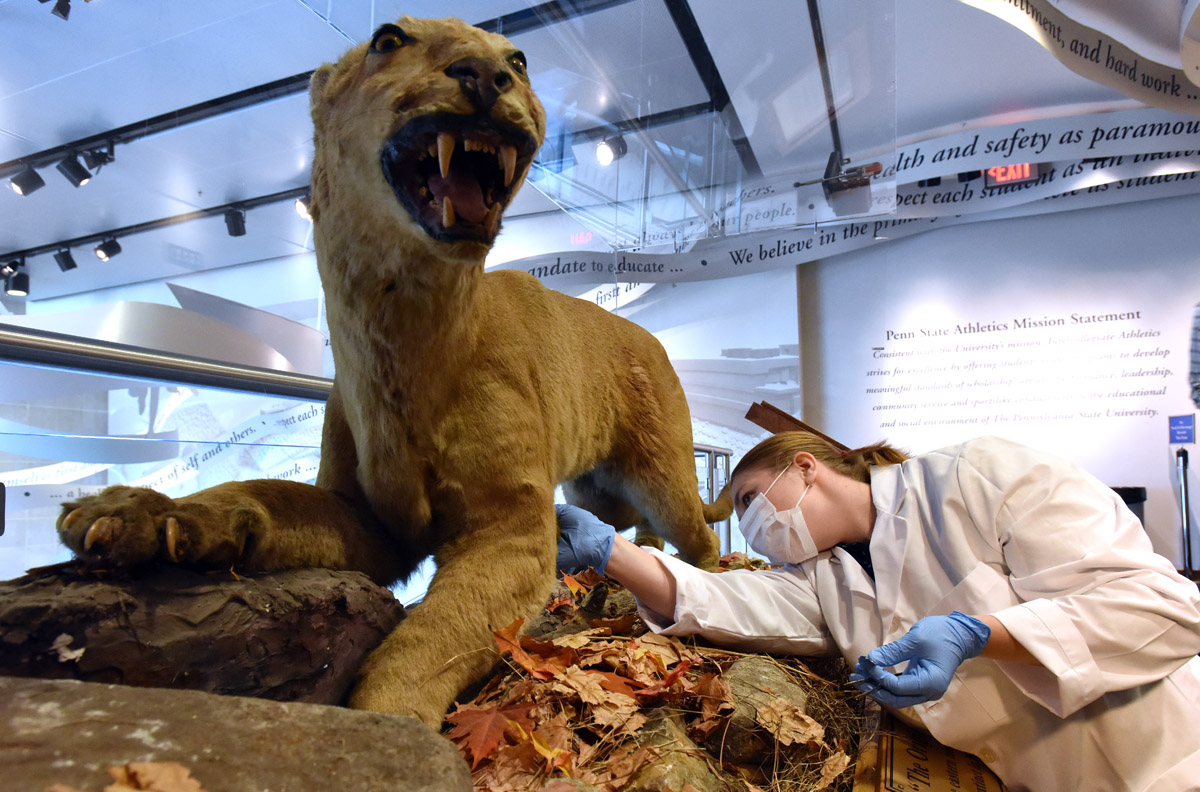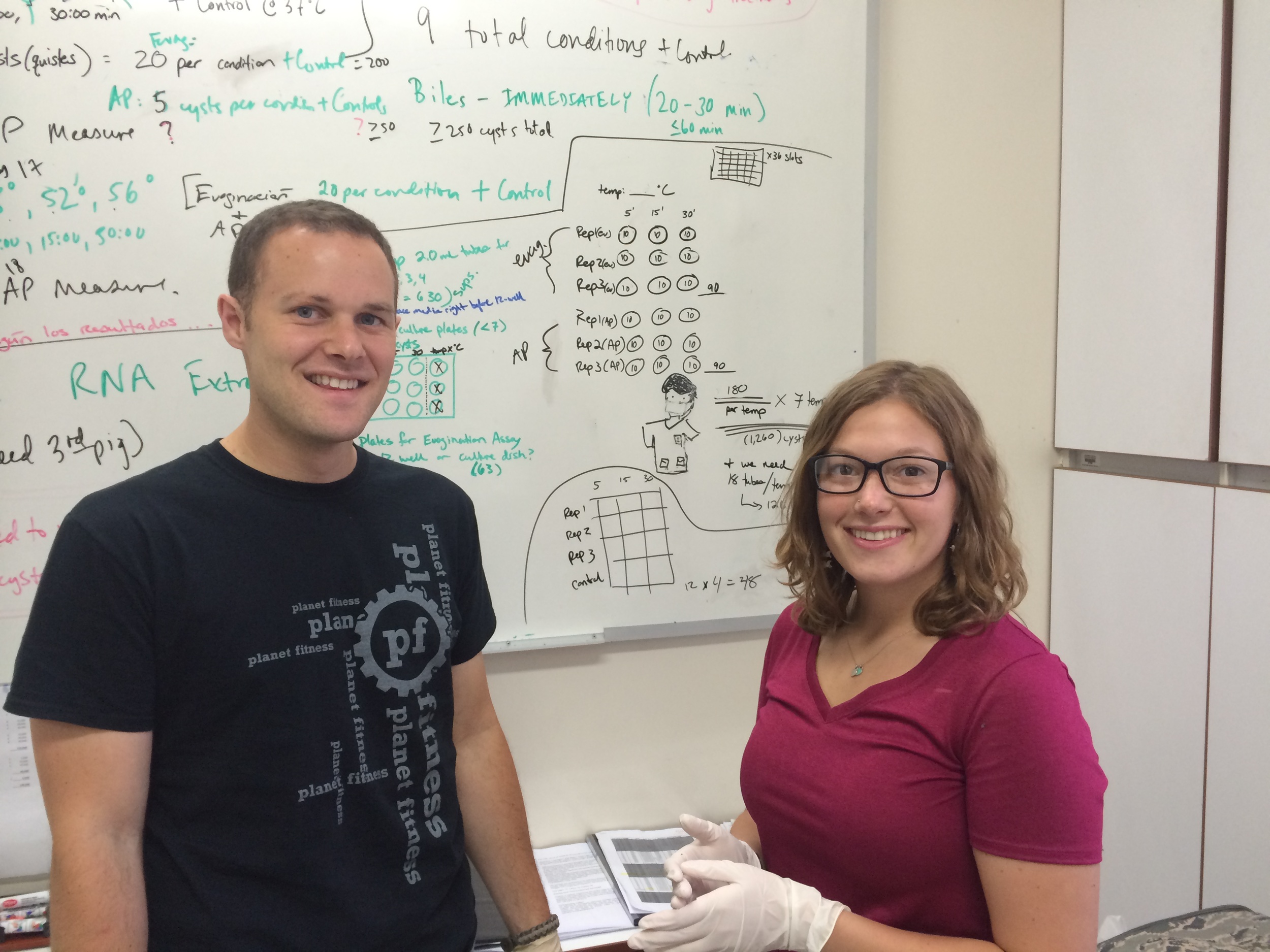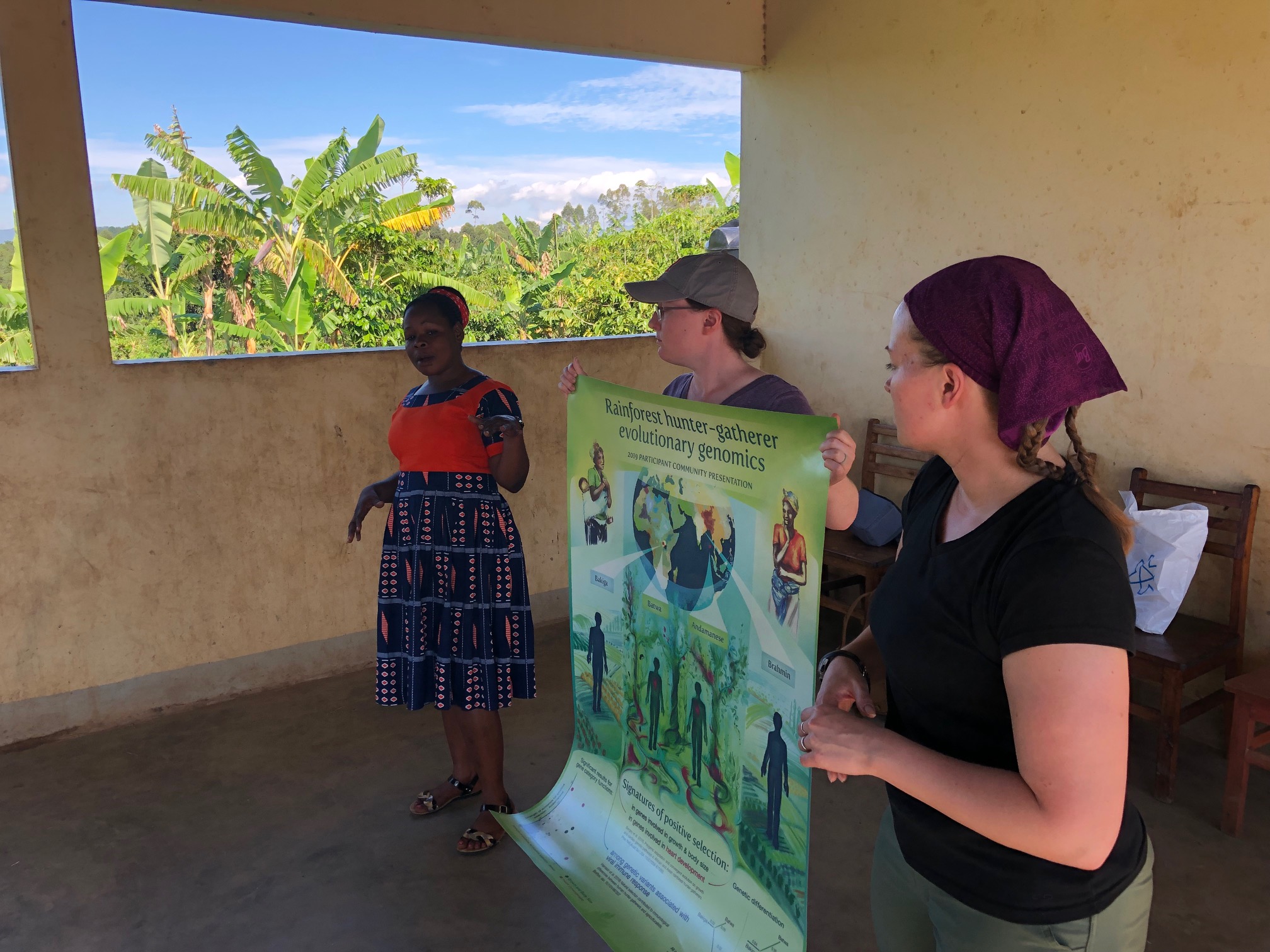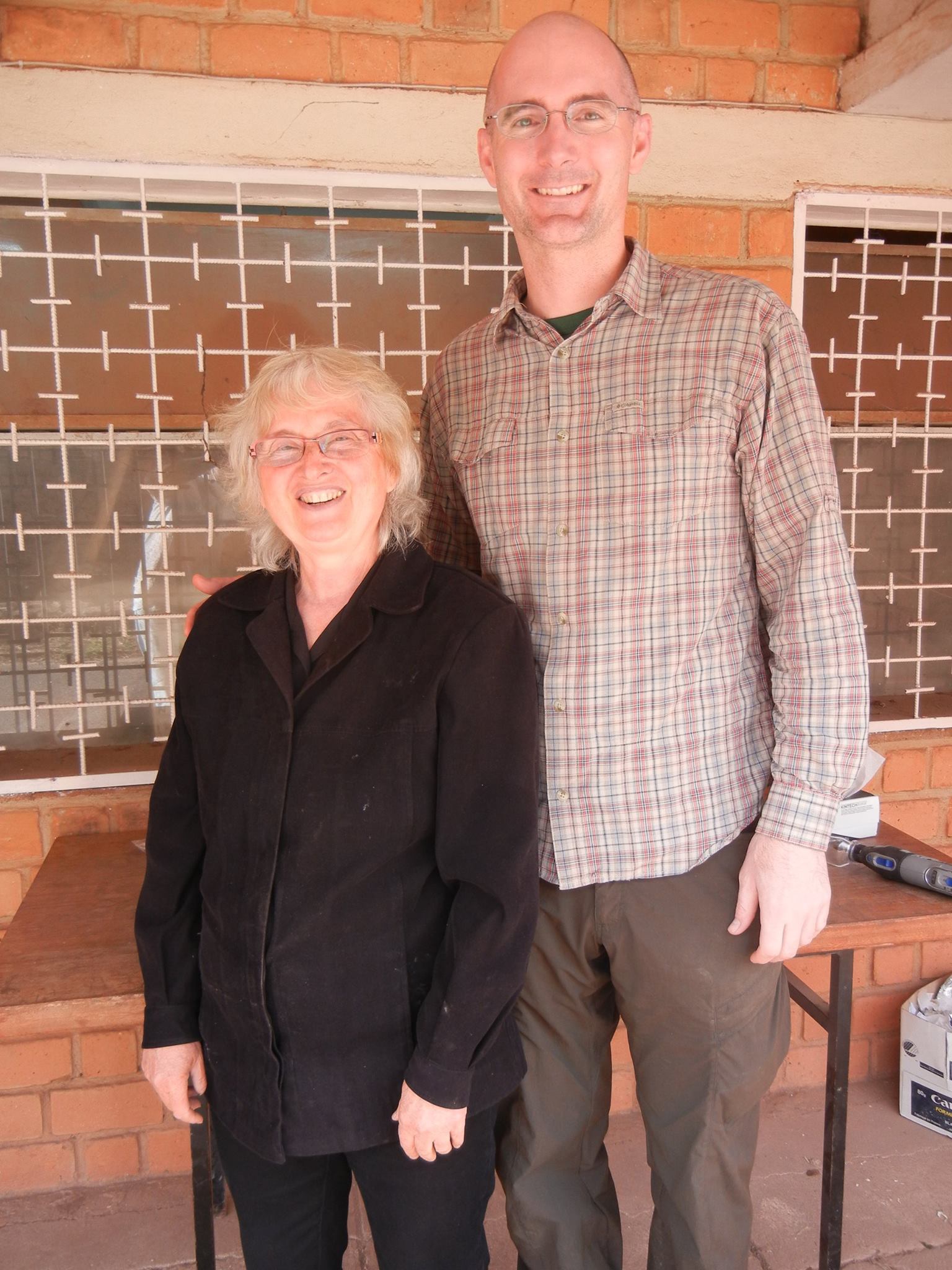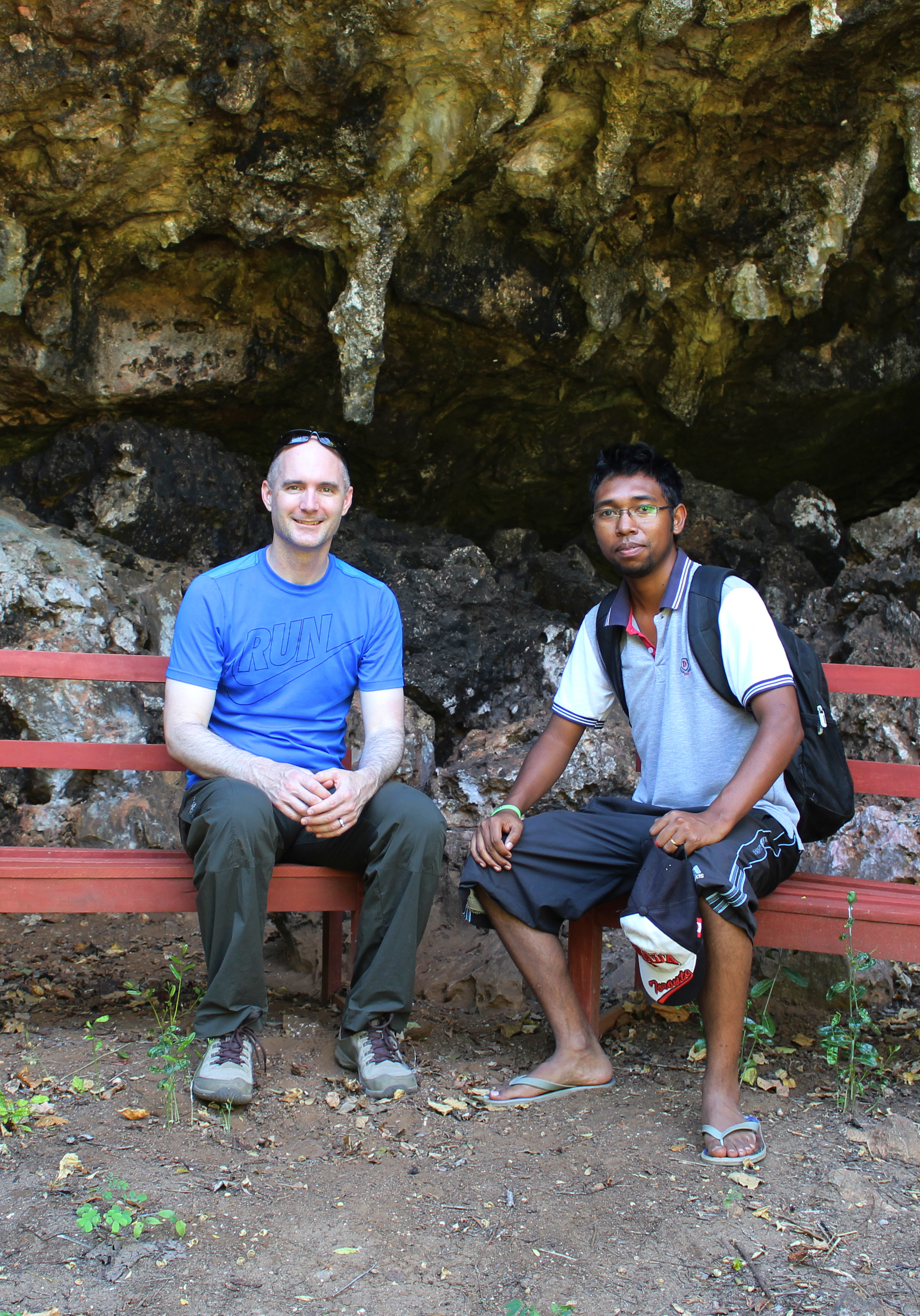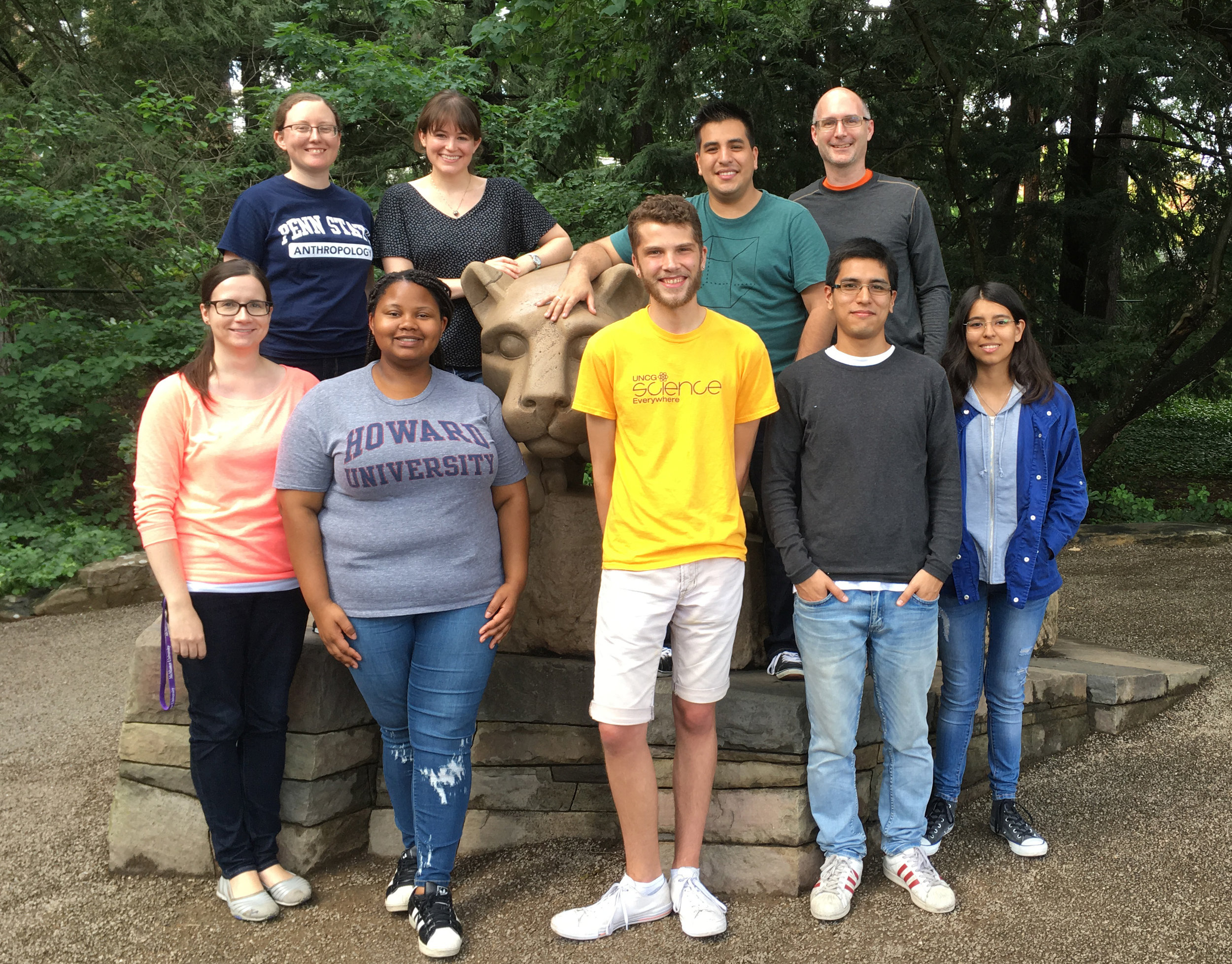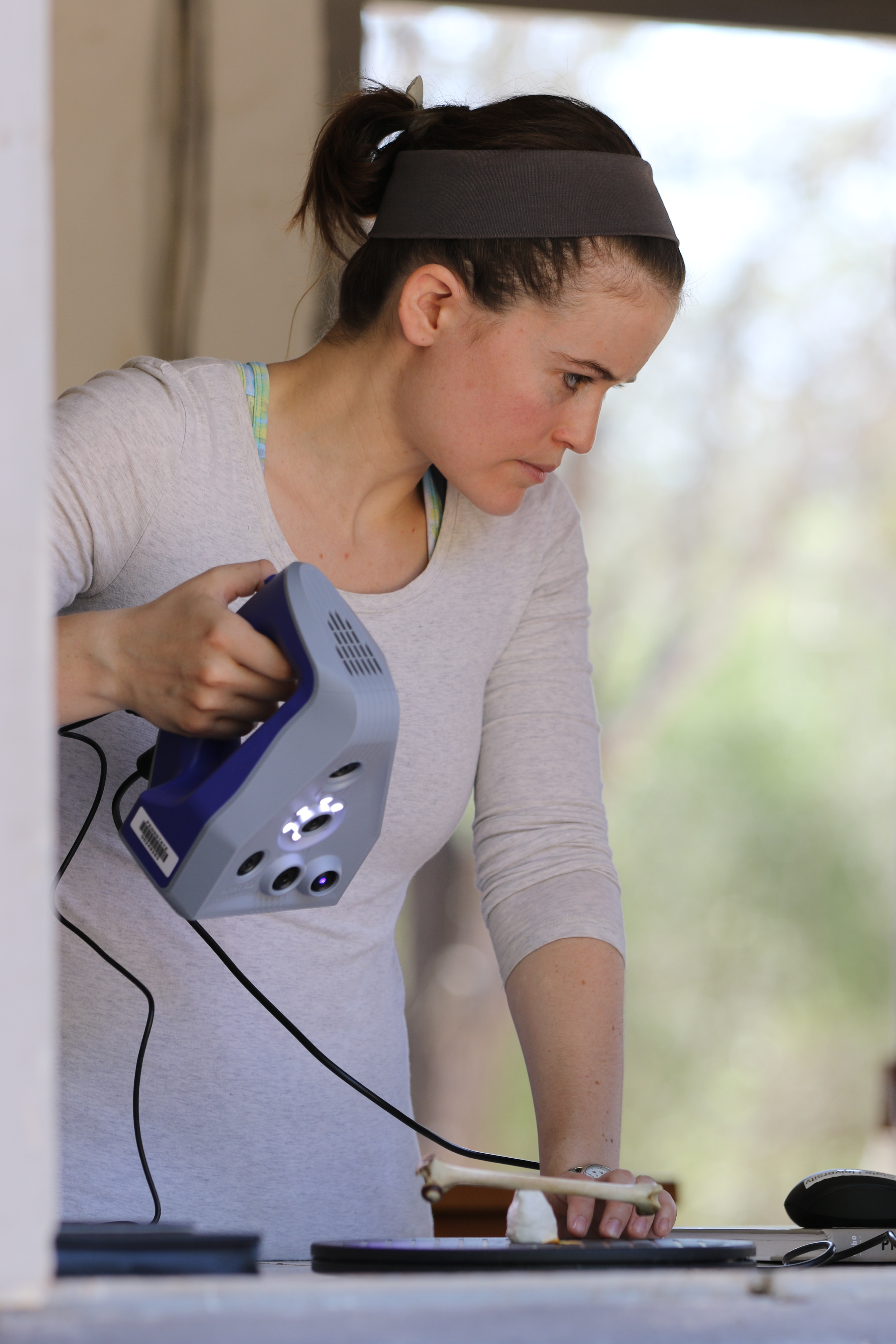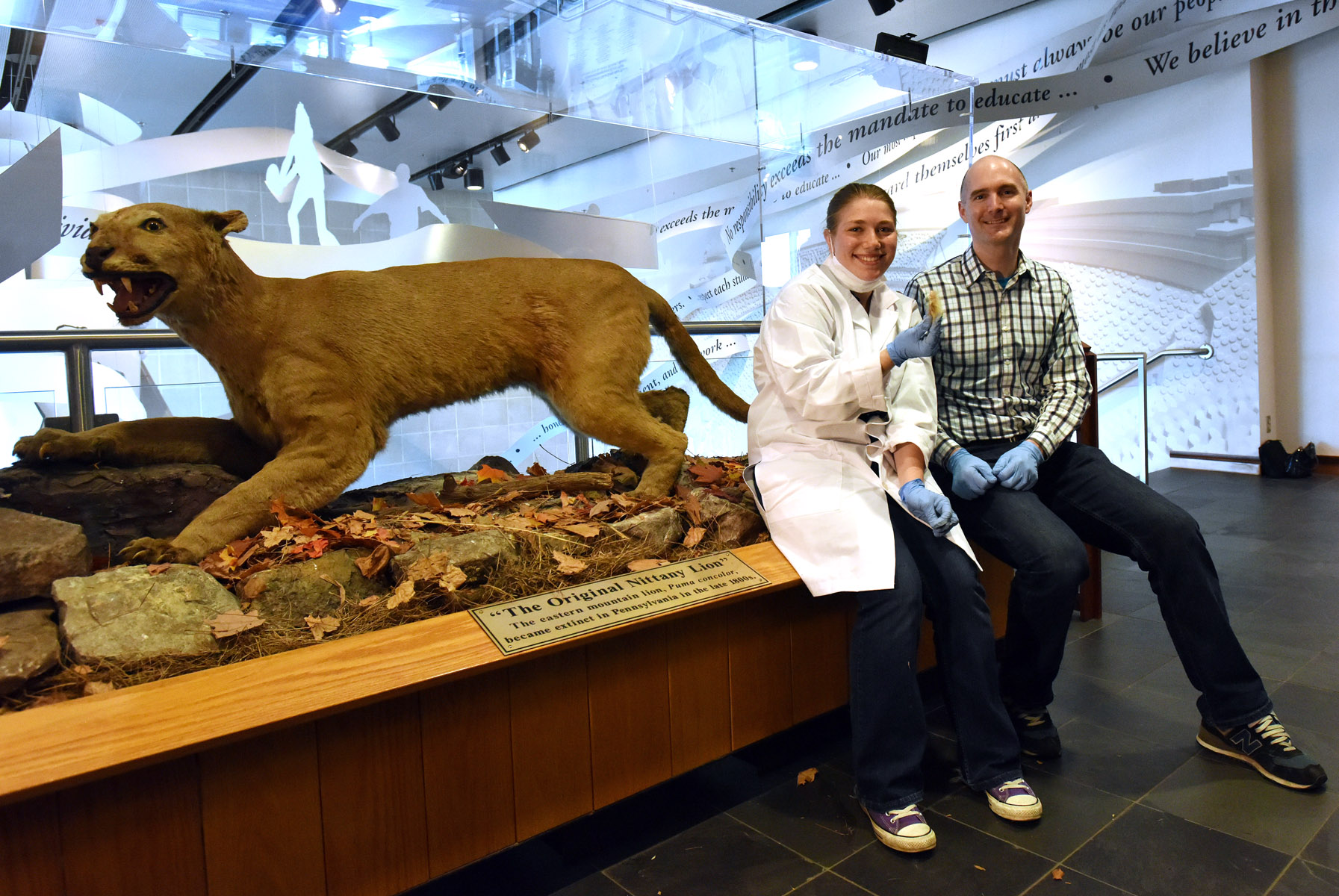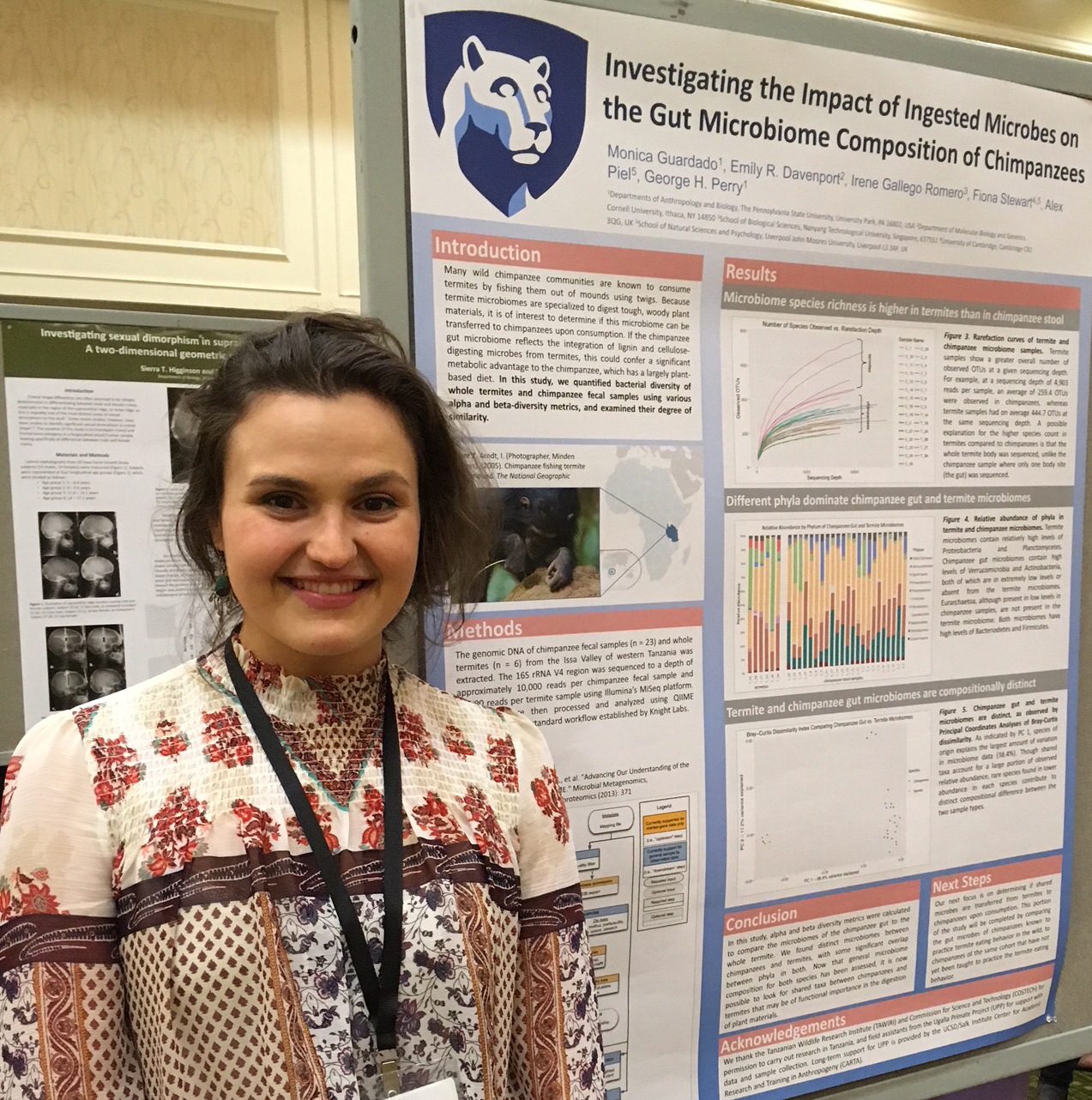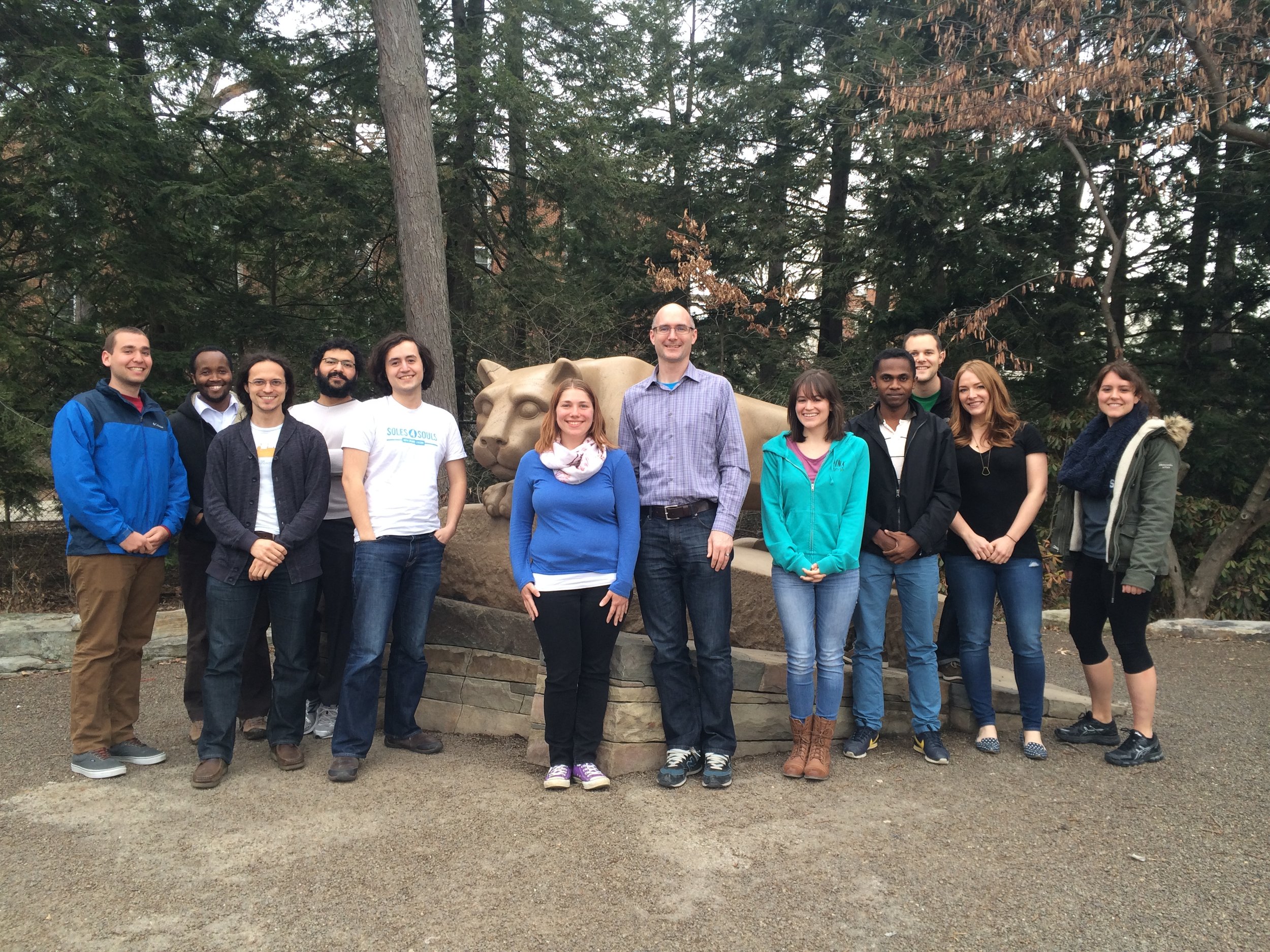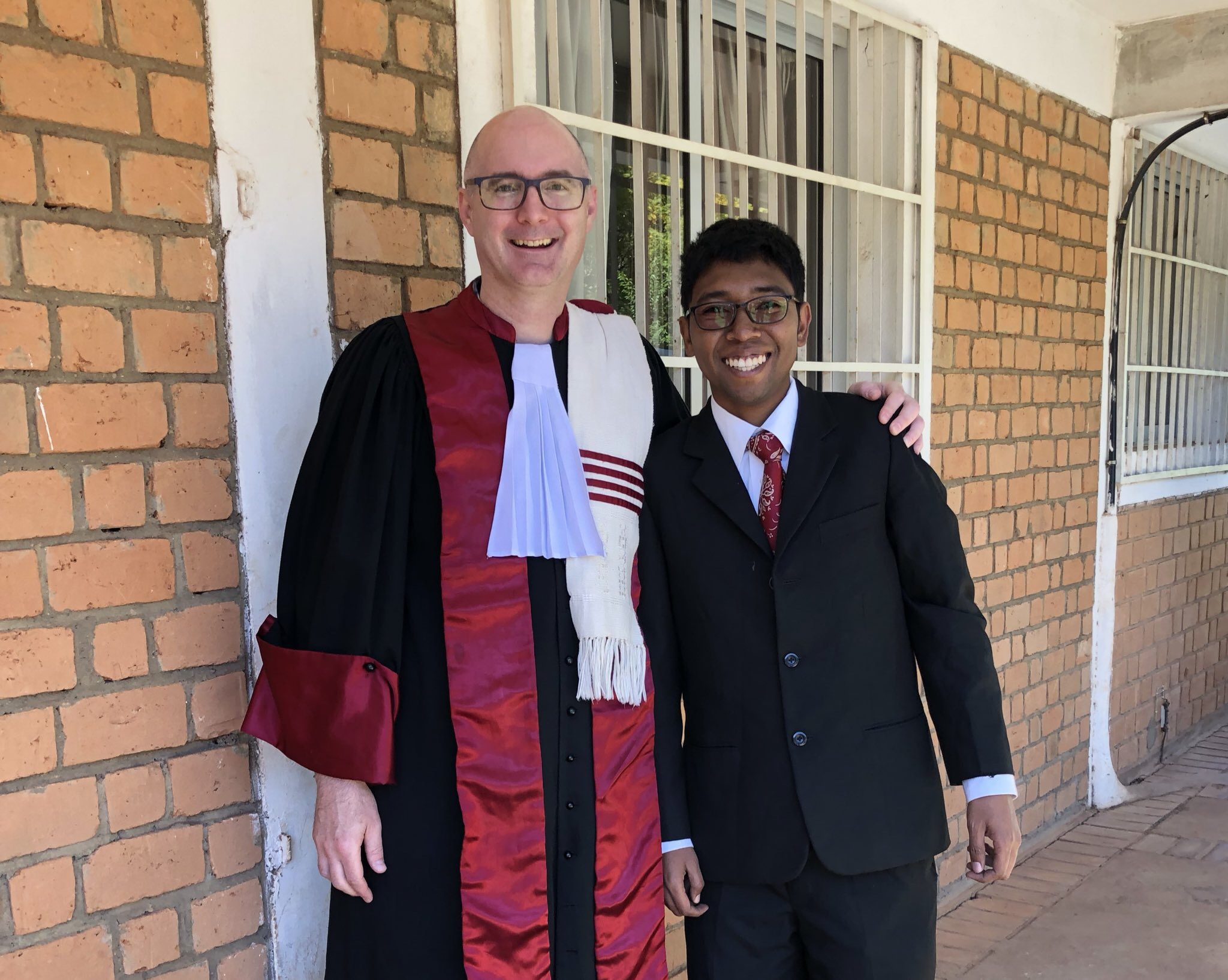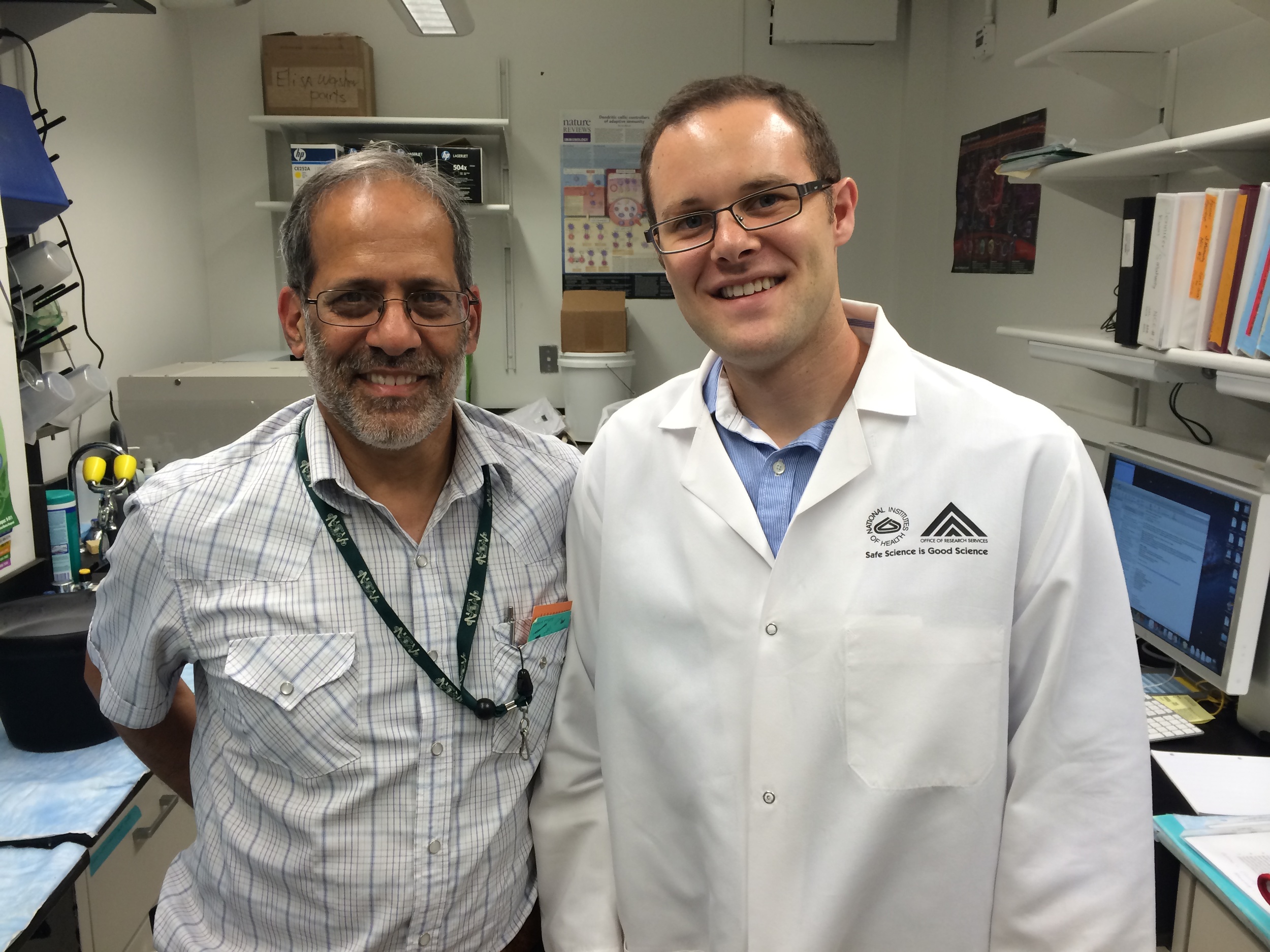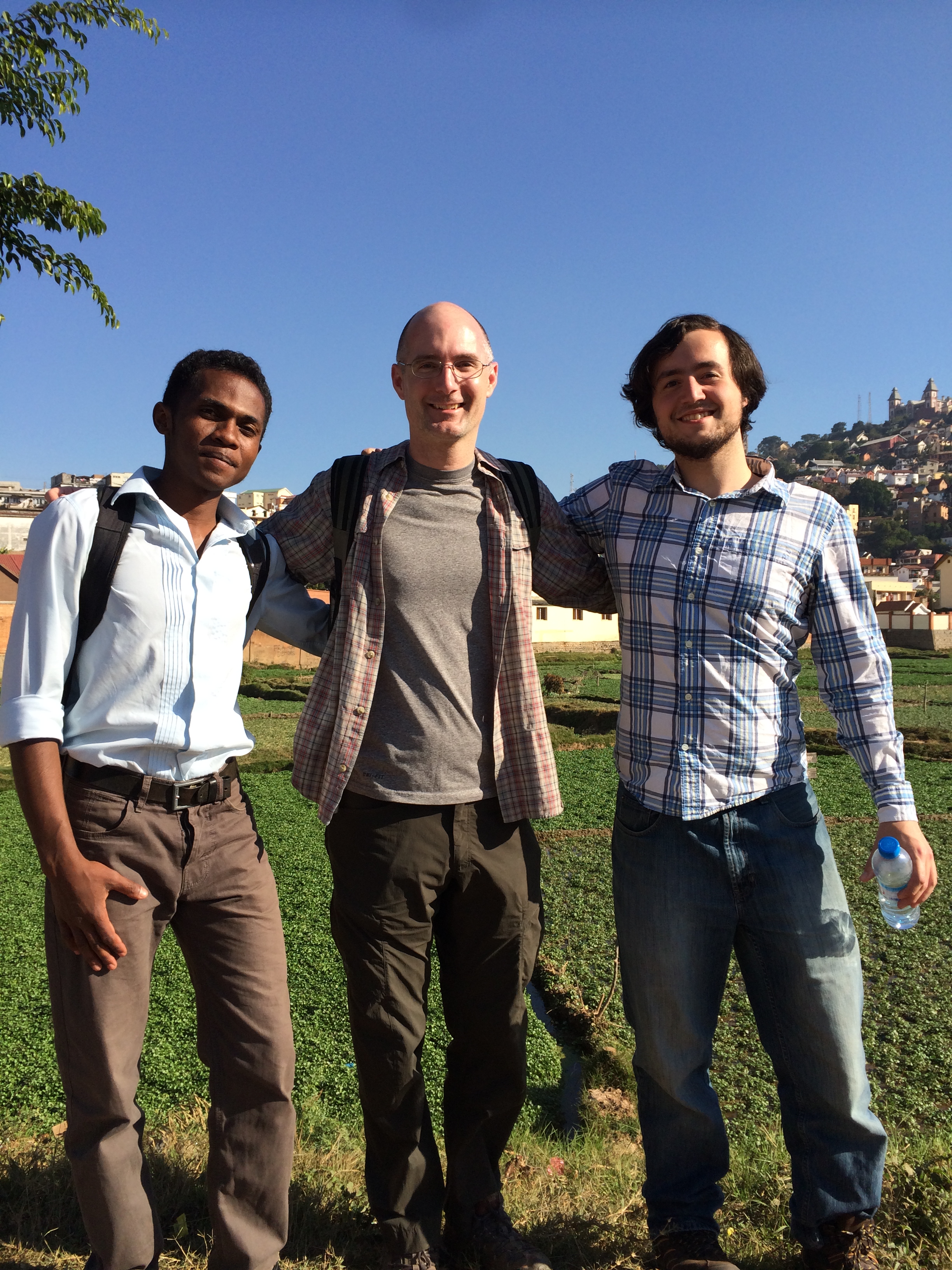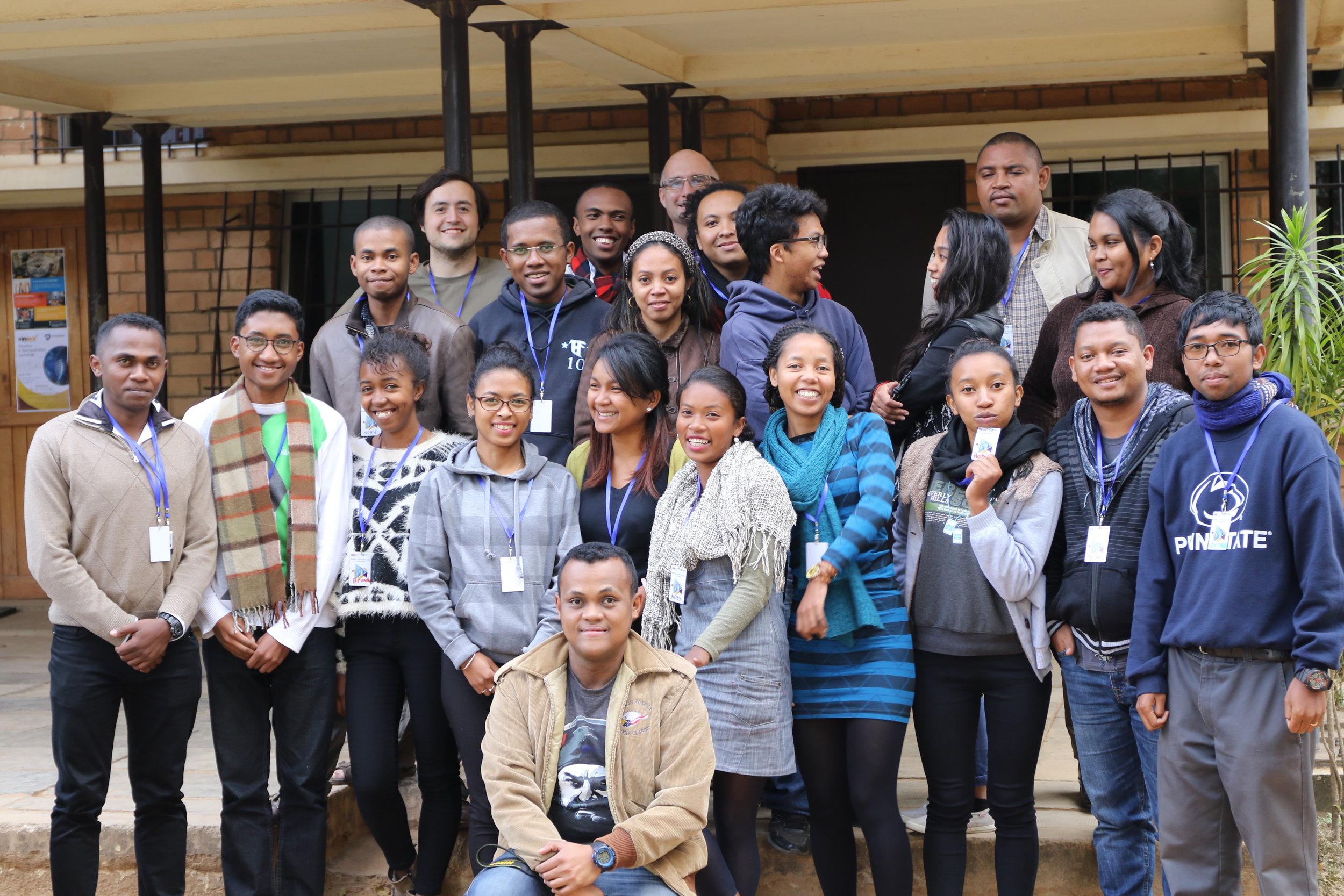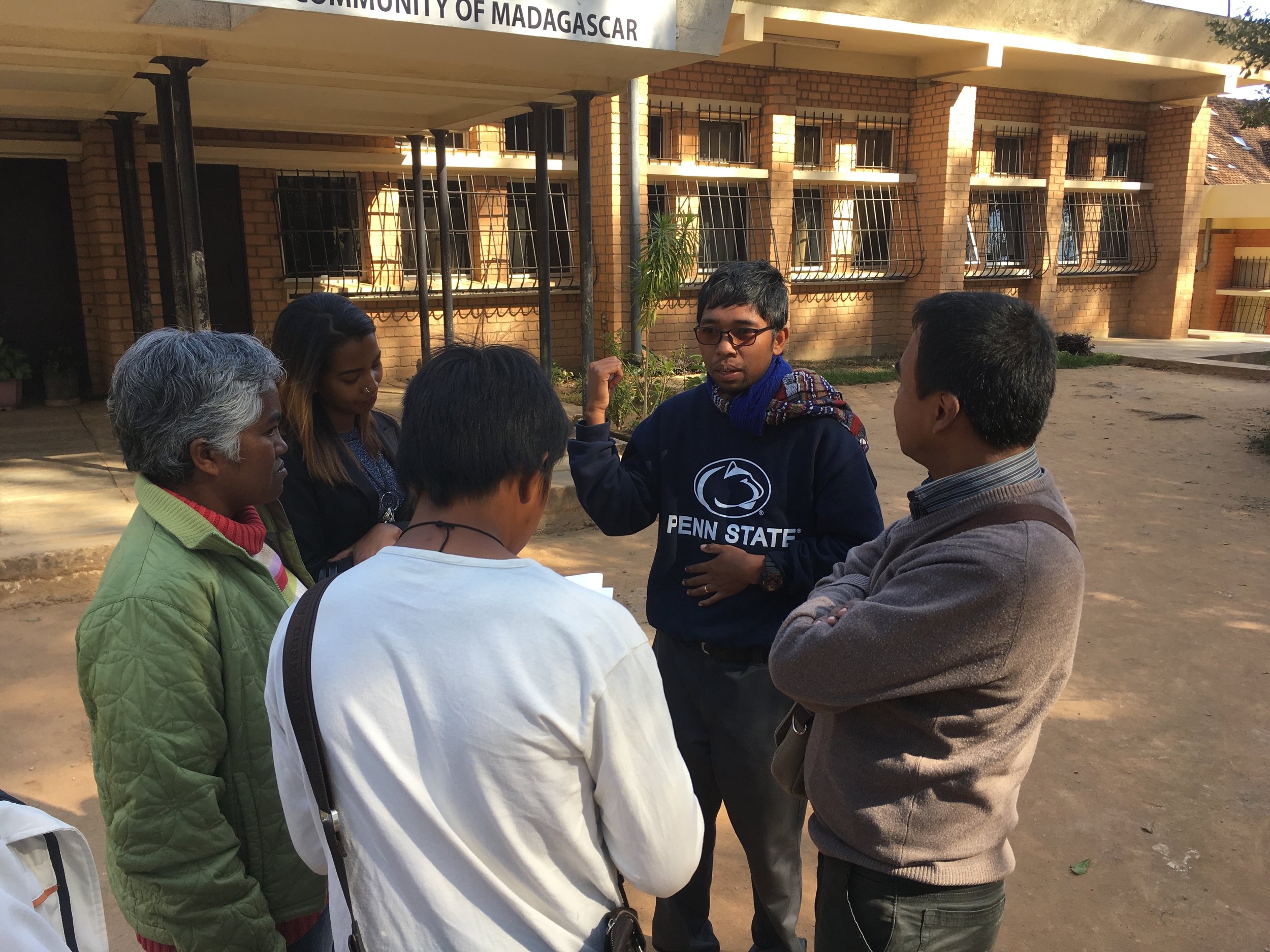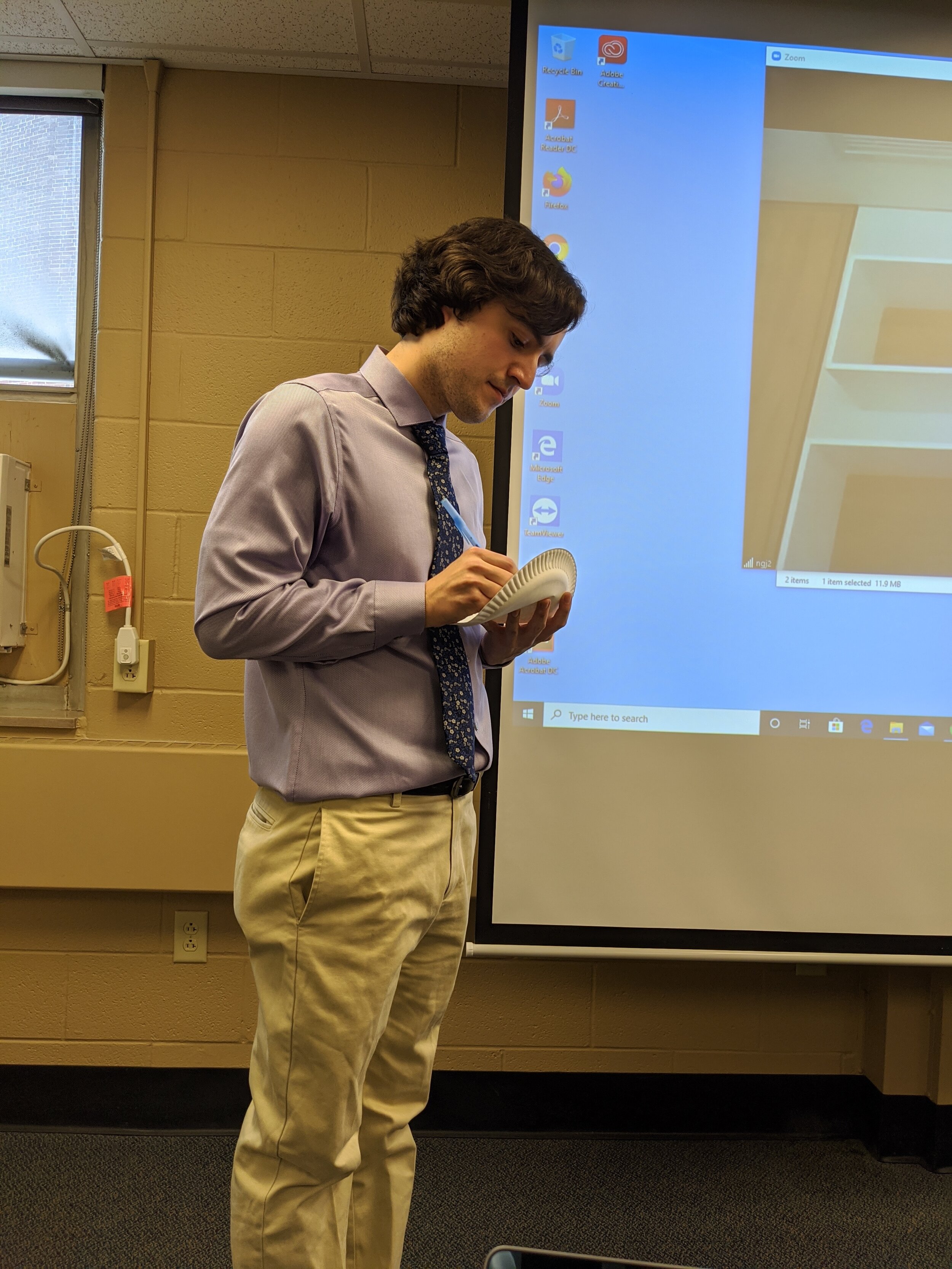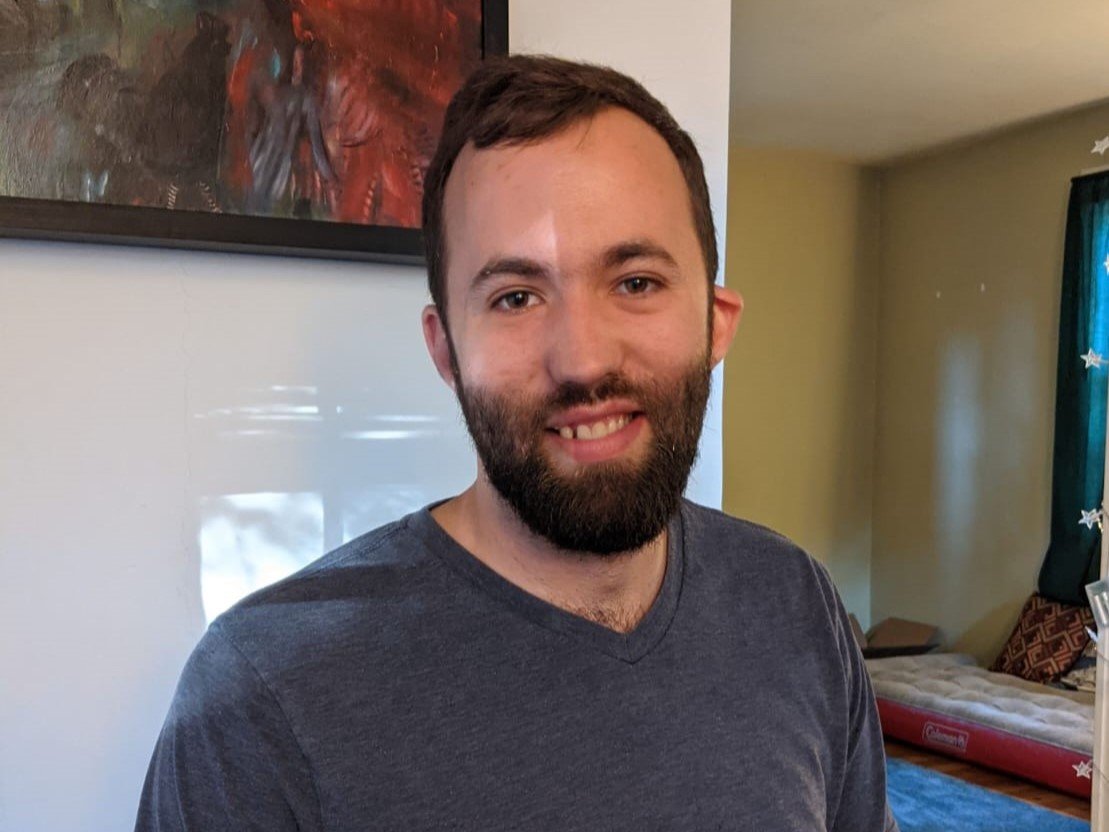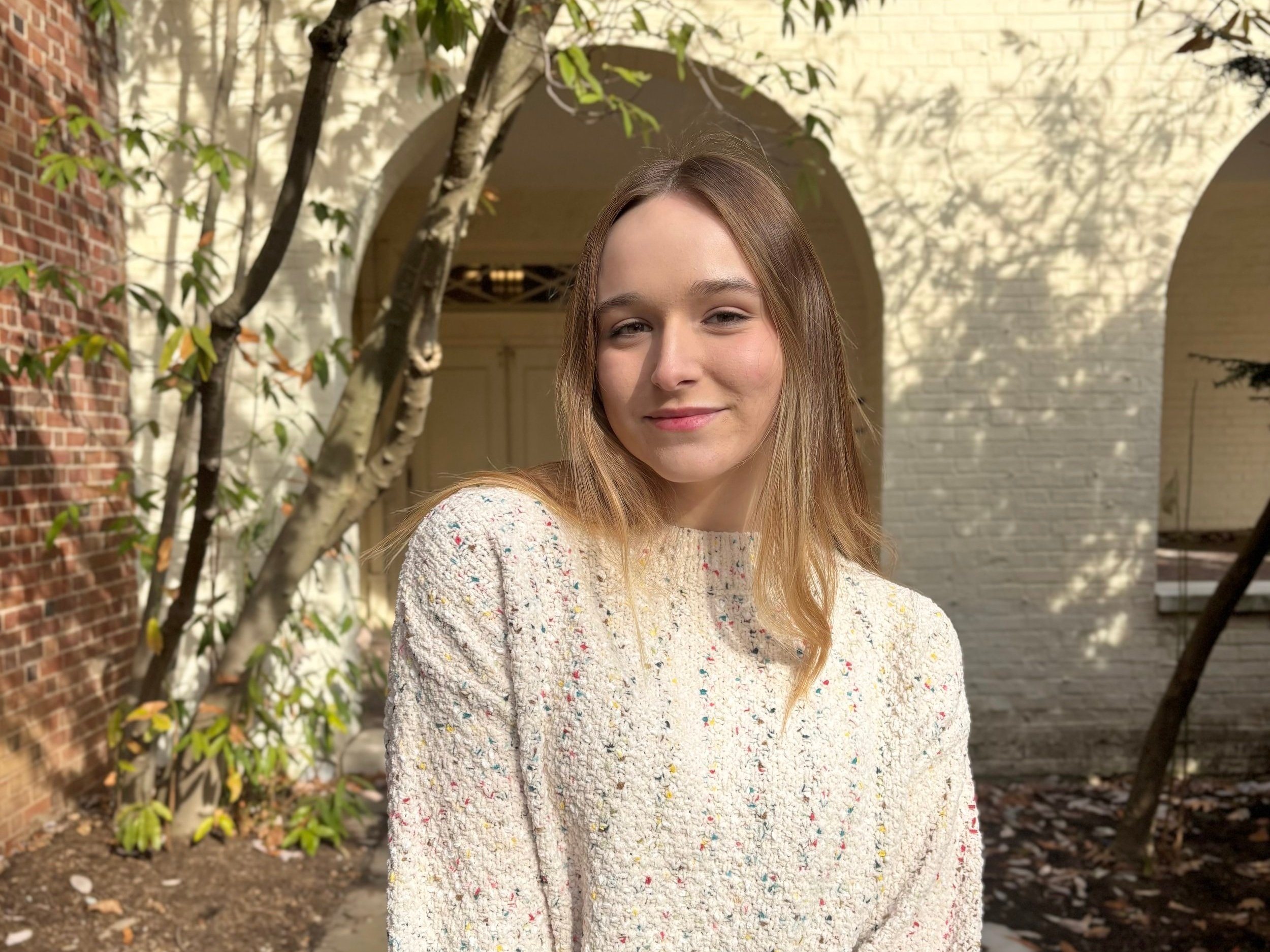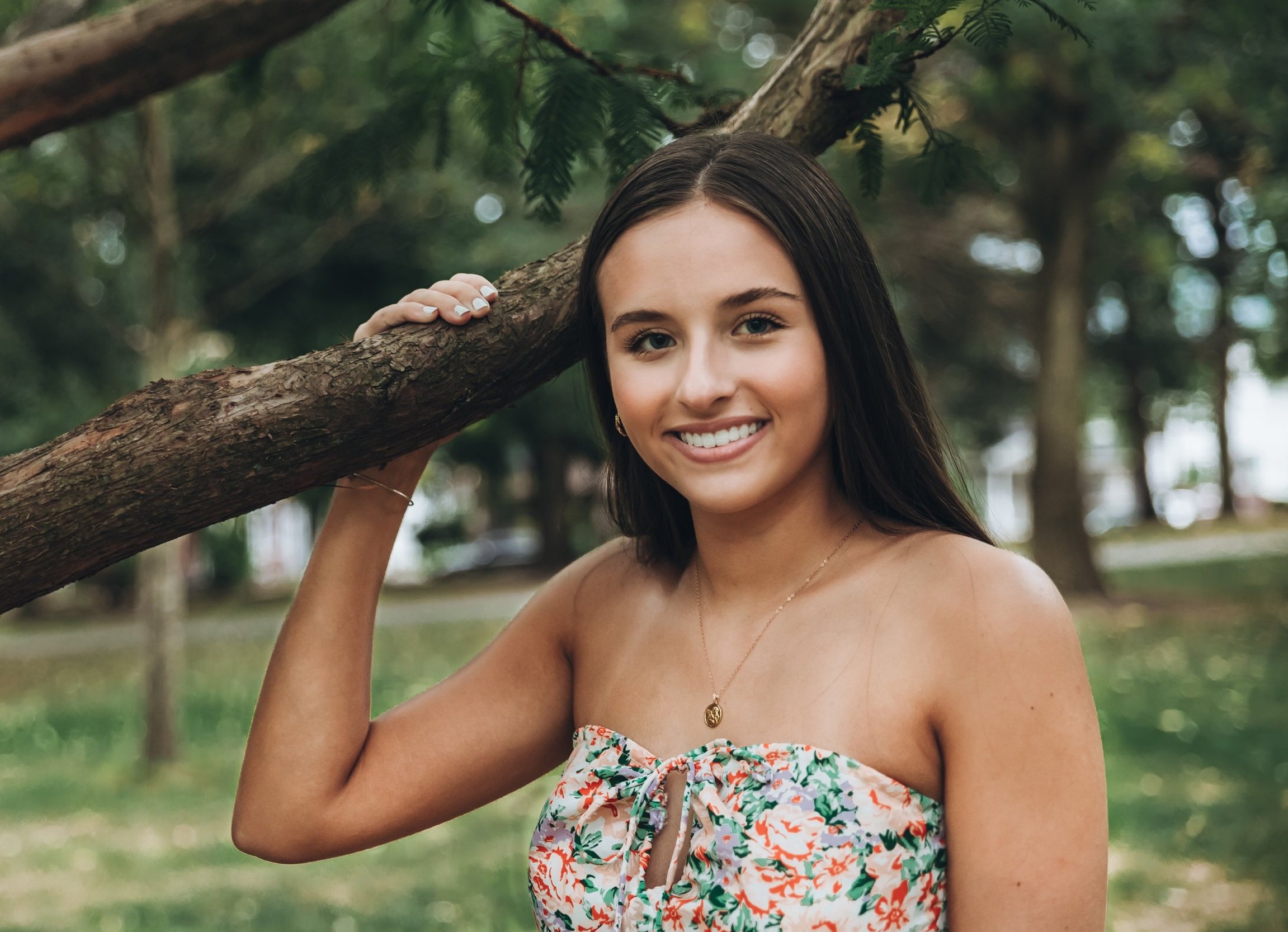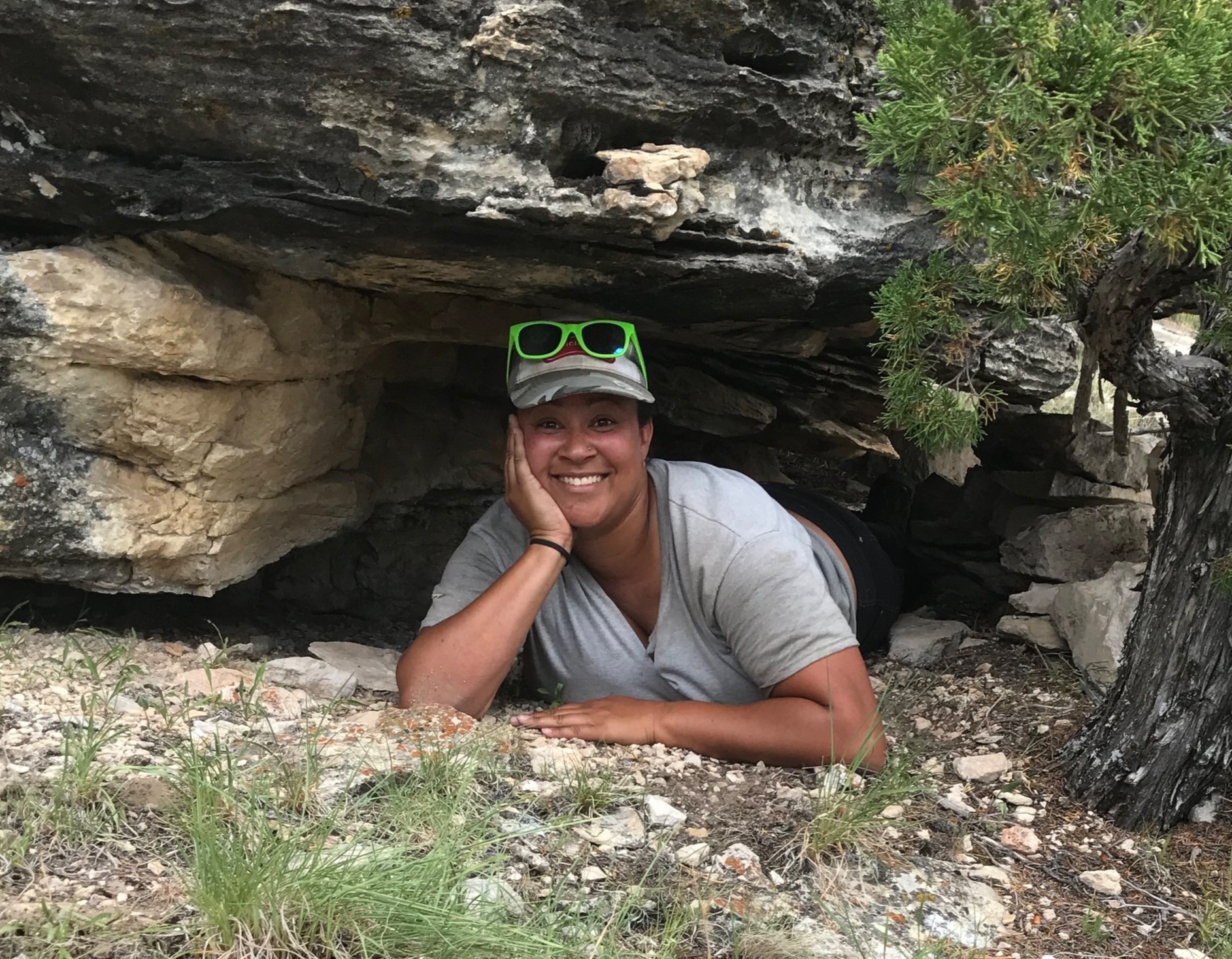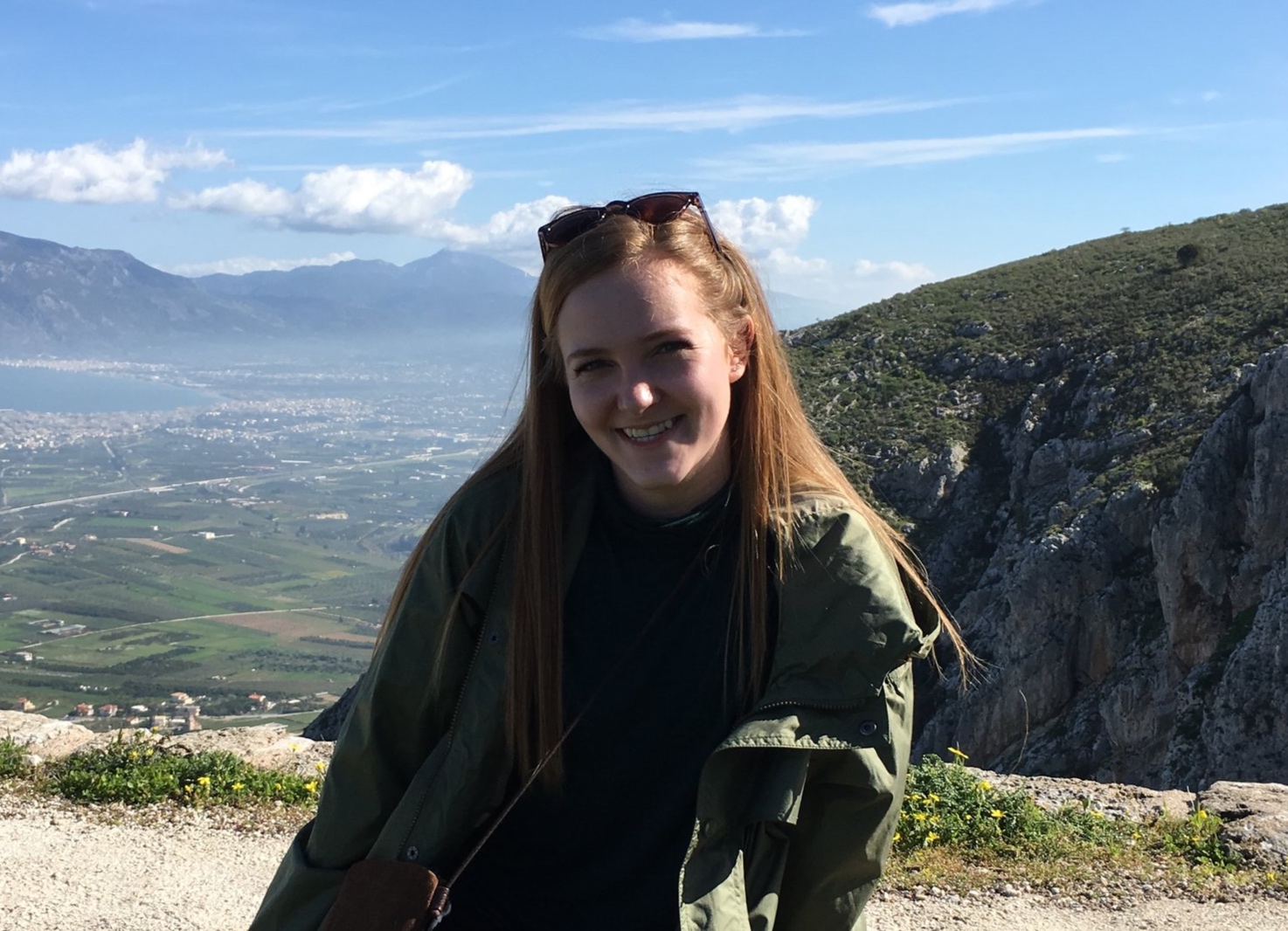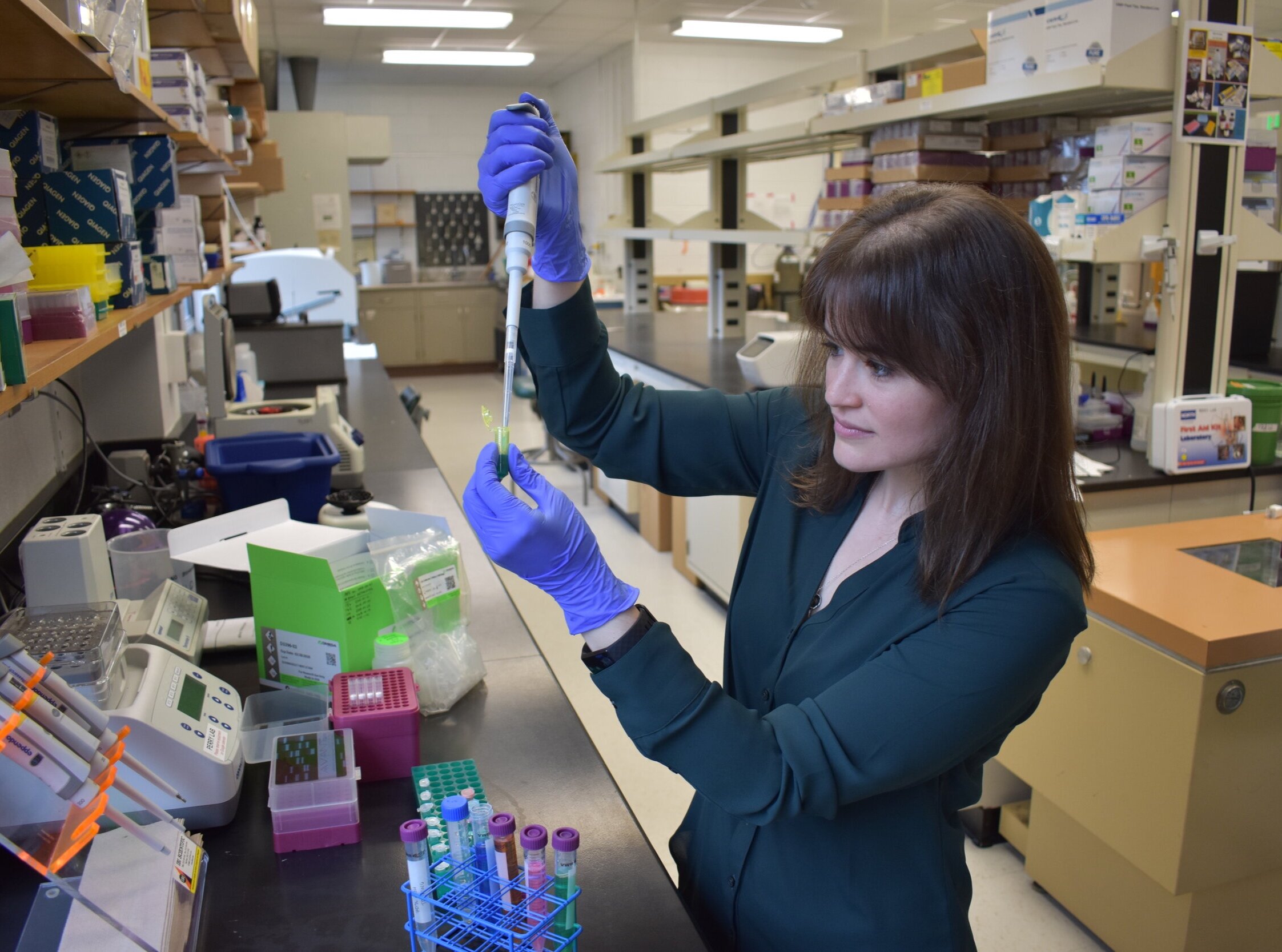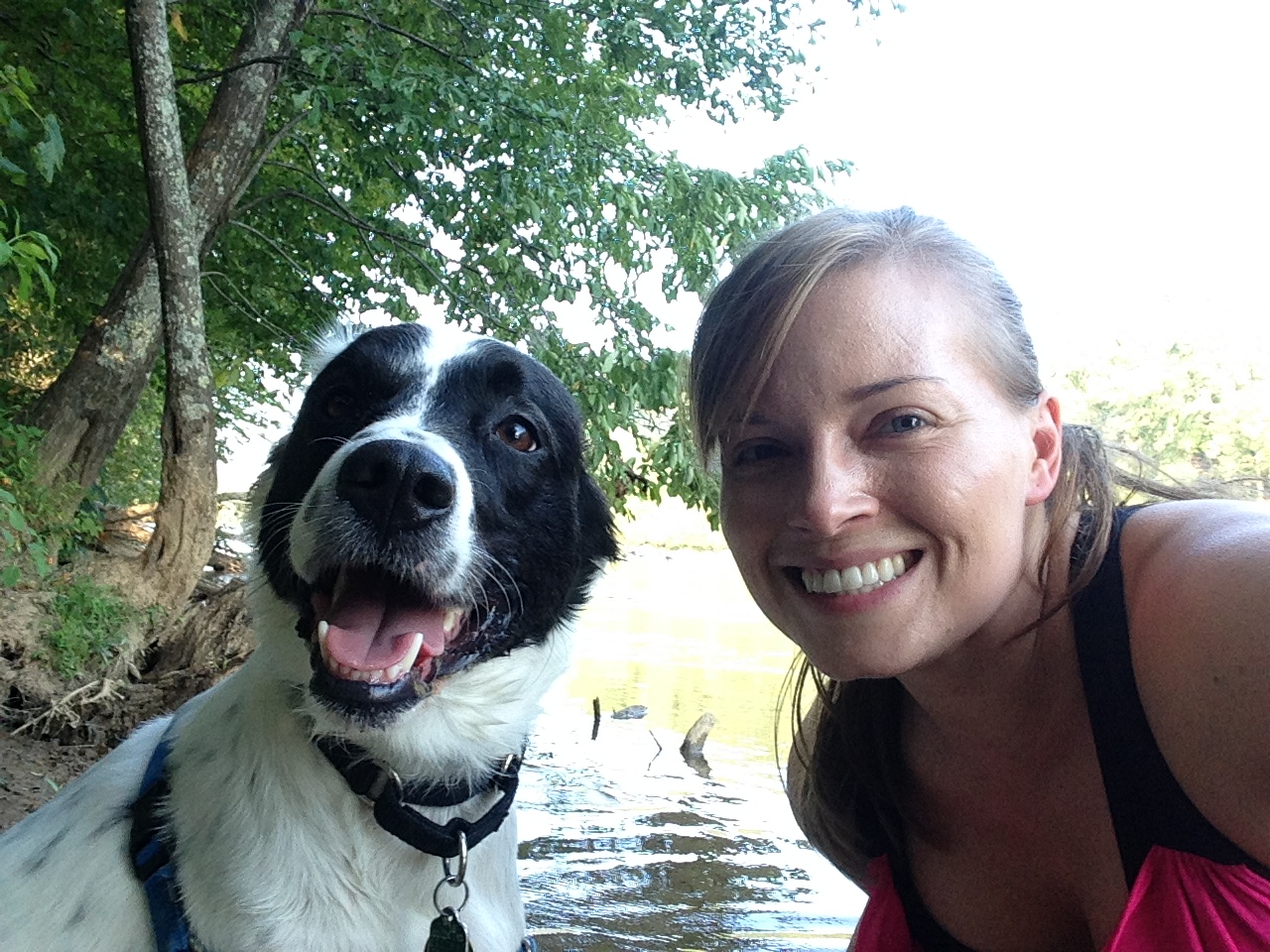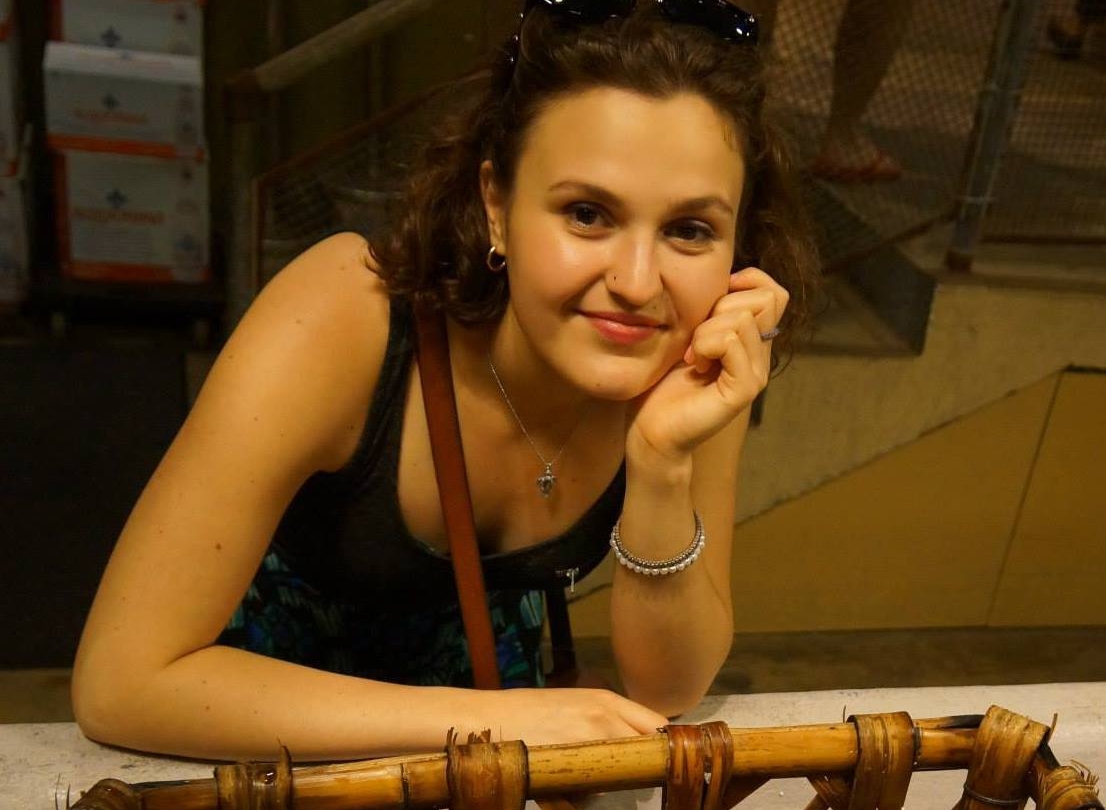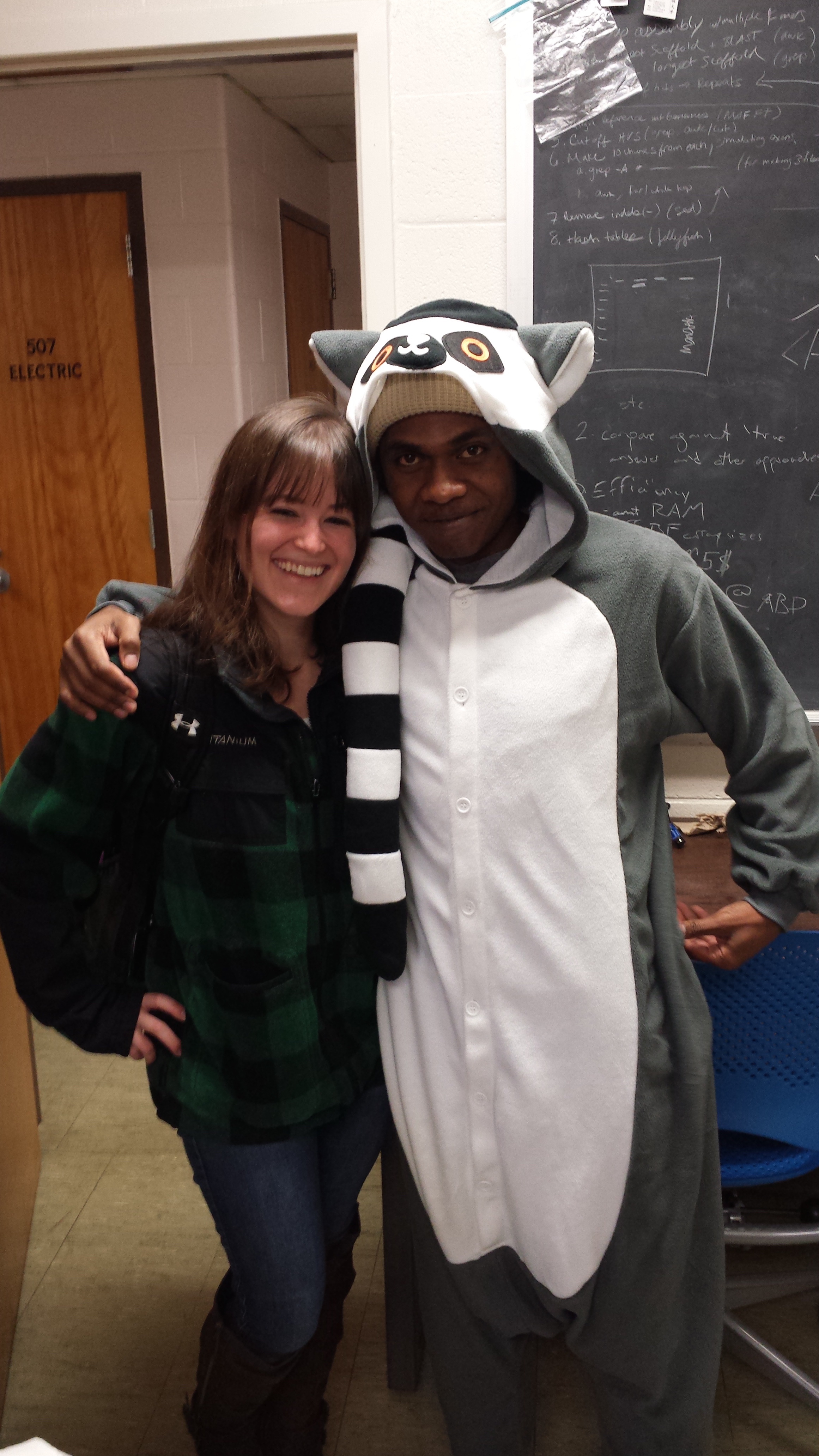George (PJ) Perry - Principal Investigator
Professor
Departments of Anthropology and Biology
Huck Institutes of the Life Sciences
Pennsylvania State University
Office: Susan Welch Liberal Arts Building - Room 219
Email: ghp3 (at) psu (dot) edu; Twitter: @grg_perry; LinkedIn: grgperry
President and Founder: boisei labs
Natalia Grube - PhD student
Department of Biology
Office: Susan Welch Liberal Arts Building - Room 224
Email: ntg5079 (at) psu (dot) edu
Natalia’s research interests include parasitology and evolution, and in our lab she is using computational approaches to study the evolutionary genomics and population structures of human parasites, and the co-evolutionary relationships between parasites and their hosts. Her main research projects in the lab are focused on tapeworms!
Laura Perez (she/her) - MD/PhD STUDENT
Medical Science Training Program and Department of Anthropology
Office: Susan Welch Liberal Arts Building - Room 217
Email: ldp5186 (at) psu (dot) edu
Laura is interested in studying non-communicable diseases through the lens of evolutionary medicine. That is, considering how our evolutionary history and current ecological and sociocultural environments impact chronic disease risk and progression. Her research will use a mixed-methods (both evolutionary genomics and ethnographic) approach. Laura is co-advised by Dr. Perry and Dr. Mary Shenk.
Laurel Moyse (she/her) - PhD STUDENT
Department of Biology
Office: Susan Welch Liberal Arts Building - Room 217
Email: lcm5558 (at) psu (dot) edu
Laurel is broadly interested in studying the interface between human health/disease and evolution. Her research uses computational approaches and genomic data to study a wide range of human diseases from an evolutionary medicine perspective.
sara Gutierrez (she/her) - PhD STUDENT
Department of Anthropology
Office: Susan Welch Liberal Arts Building - Room 221
Email: smg6246 (at) psu (dot) edu
Sara is interested in using ancient DNA to learn more about the lives of people living in the past, including across times of prehistoric climate and/or cultural change. She aims to integrate different forms of genetic and archaeological data to study population and and evolutionary histories. Sara is also interested in bioethics and initiatives related to data management and community engagement. She is co-advised by Dr. Perry and Dr. Laura Weyrich.
rachel palkovitz (she/her) - PhD STUDENT
Department of Anthropology
Office: Susan Welch Liberal Arts Building - Room 224
Email: rep5378 (at) psu (dot) edu
Rachel is interested in how human behavior impacts the evolutionary biology of non-human species, especially culturally significant native plants in the United States facing conservation threats in the wild. She is working on a project investigating the influence of human cultivation on phenotypic and genetic diversity of American ginseng (Panax quinquefolius) through the Appalachian Botany and Ethnobotany Program. Her other interests include citizen science and wildlife education; she volunteers at Shaver’s Creek Environmental Center.
Kyle Smith (he/him) - PhD STUDENT
Department of Anthropology
Email: kyle.smith (at) psu (dot) edu; Twitter: @kylecmsmith
Kyle is interested in how the social relationship between dogs and humans shaped dog behavior and cognition through the domestication process. His main project takes place at Tudek Dog Park in State College, PA, where he studies the interplay between dogs' cognition, social behavior, and biology.
Annette Mercedes - PhD STUDENT
Molecular, Cellular, & Integrative Biosciences Interdisciplinary Graduate Program
Office: Susan Welch Liberal Arts Building - Room 217
Email: arm7254 (at) psu (dot) edu
Annette’s educational background spans anthropology, immunology, and public health. She is interested in the evolution of immunity, including how antagonistic pleiotropy and adaptive trade-offs shape immune responses. She aims to integrate evolutionary dynamics, comparative genomics, ancient DNA, and functional immunology approaches to explore how immune responses are shaped across human and non-human primate populations, with implications for public health and evolutionary medicine.
An nguyen - UNDERGRADUATE STUDENT
Major in Biochemistry ; Minor in Anthropology (at Temple University)
Email: an.nguyen0016 (at) temple (dot) edu
An is a Biochemistry major with a minor in Anthropology at Temple University. They're interested in relationships among human evolutionary genomics, human-environment interactions, and disease, and they are currently working on evolutionary medicine-related projects with Laura Perez. An’s other research-related interests include improving diversity and equity in STEM education.
wyatt mccafferty (he/him) - UNDERGRADUATE STUDENT
Major in Biology
Email: wbm5249 (at) psu (dot) edu
Wyatt is a Biology major interested in advancing understandings of the relationships among human genetic variation, environmental variation, disease expression, and medicine as he prepares for medical school and a health professional career. He has interest in understanding medicine from integrated biological, cultural, and data science perspectives. He is working on human evolutionary medicine projects in the lab!
Jacqueline Fassbender - UNDERGRADUATE STUDENT
Major in Integrative Science via the BS/MBA Program
Schreyer Honors College
Email: jzf5788 (at) psu (dot) edu
Jackie is interested in the intersection between science and human behavior, and how that can be reflected in the evolutionary interactions between parasites and their hosts.
Daniela Collins - UNDERGRADUATE STUDENT
Majors in Anthropological Sciences and Spanish
Schreyer Honors College
Email: dqc5819 (at) psu (dot) edu
Daniela is interested in human evolutionary biology, population genetics, and biological anthropology. She has a biotechnician certificate and she will be training with PhD student Annette Mercedes on her evolutionary medicine and functional immunology projects, before developing an independent project!
Previous lab members:
Lauren Heverly (she/her)
2022-2024: Undergraduate (Major in Biology; Minor in Environmental Inquiry)
Lauren was interested in the evolutionary history of human diseases and the relationship between disease and disease resistance evolution and environmental variation and change. She worked closely with MD/PhD student Laura Perez on both mentored and independent bioinformatics-based human evolutionary medicine projects.
Maggie Hernandez (she/they)
2017-2024: Graduate student (Anthropology)
Currently: Postdoc, Department of Anthropology, Dartmouth College
Maggie was an NSF Graduate Research Fellow and she also received the NIH Predoctoral to Postdoctoral Transition Fellowship for a Diverse Genomics Workforce (F99/K00) from the National Human Genome Research Institute. Maggie used a mixed-methods approach to study how genetics and socio-environmental variation influenced health within and among different waves of Cuban immigrants to the United States. Here is a phenomenal PSU News story about Maggie’s research. She was co-advised by Dr. Perry and Dr. Mary Shenk.
Heritiana Randrianatoandro
2015-2022: Graduate student (University of Antananarivo, Madagascar)
Our lab supervised Heritiana’s PhD research -- he collected paleogenomic and morphological data to test existing species definitions within the extinct subfossil lemur genus Archaeolemur. Heritiana’s co-advisors for this project are Laurie Godfrey (University of Massachusetts) and Jeannot Randrianasy (University of Antananarivo). He was recently at Penn State for one year for ancient DNA labwork and dissertation research.
ebony creswell
2019-2022: Graduate student (Anthropology)
Ebony was an NSF Graduate Research Fellow with broad interests in archaeology and the paleoepidemiology of infectious diseases. As a student in the lab, Ebony worked to integrate ethnographic, epidemiological, and archaeological data to help advance our understandings of how different social systems affect disease spread and overall human health.
Emily Gagne (she/her)
2019-2022: MS student (Ecology)
Emily received an M.S. in Ecology. Her interests included the scholarship of evolutionary biology education, and her M.S. thesis reported on the approach and assessment of a genomics and bioinformatics workshop in Madagascar that she co-developed and led.
Braulio Assis (he/him)
2022-2023: Postdoctoral Fellow (Anthropology and Biology)
Currently: Postdoc, University of North Carolina
Braulio’s first was co-advised (with Tracy Langkilde as his primary advisor) before joining our lab full-time. Braulio is an evolutionary ecologist from Brazil who explores different levels of biological complexity (genetics, microbiomes, animal behavior, community ecology) to better understand how organisms adapt to environmental anthropogenic change. While part of our lab he helped lead a study on fence lizard evolutionary genomic responses to human-introduced fire ants.
Carter Clinton (He/him)
2021-2023: Postdoctoral Fellow (Anthropology and Biology)
Currently: Assistant Professor, Department of Biological Sciences, North Carolina State University
Carter’s research interests while a postdoc in our lab included exploring the genomic identities, evolutionary diversity, and genetic diseases of African descended peoples through analyses of both modern and ancient DNA.
Diego hernandez (they/them)
2021-2023: Graduate Student (Anthropology)
Currently: Scientist at Johnson & Johnson
Diego is broadly interested in human evolutionary genomics and while part of our lab they developed several functional and evolutionary genomics projects with human parasites for making proxy insights about key time periods and cultural innovations in human evolution.
Anubhab Khan
2020-2022: Data analyst
Currently: Assistant Professor, Centre for Ecological Sciences, Indian Institute of Science (IISc)
Anubhab worked with the lab as a bioinformatics consultant (and remains a collaborator). Anubhab was a PhD student at the National Centre for Biological Sciences, India, where he worked on the population genomics of small isolated populations, including via the generation of the largest whole genome sequence dataset to date for wild tigers. Going forward, he is interested in understanding the drivers of genomic diversity and morphometric variation in natural populations of wild species.
Stephanie Marciniak (she/her)
2016-2021: Postdoctoral Fellow (Anthropology)
2021-2022: Research Assistant Professor (Anthropology)
Currently: Research Associate, Department of Anthropology, McMaster University
Stephanie directed our lab’s ancient DNA research at Penn State and led major archaeogenomic projects including one on the nuclear genome of an extinct, giant subfossil lemur, and one that combined ancient DNA and osteological data from the same prehistoric European individuals to study the health-related impacts of the agricultural transition.
Audrey Arner (she/her)
2016-2020: Undergraduate (Majors in Biological Anthropology and Biology; Schreyer Honors College; Millennium Scholars Program)
2020-2021: Research technician and data analyst
Currently: PhD student, Vanderbilt University
Audrey was an outstanding undergraduate honors student in our lab for four years while also being part of Penn State’s Millennium Scholar Program and the prestigious Presidential Leadership Academy. Audrey’s honors thesis research was on the evolutionary genomics of human sexual dimorphism. She subsequently worked in our lab for a year before beginning her PhD career at Vanderbilt!
Mariah elser (she/her)
2018-2021: Undergraduate (Biological Anthropology major; Spanish, Biology, & CAMS minors; Schreyer Honors College; Paterno Fellows Program)
Currently: Graduate student, New York Chiropractic College
Mariah was a Paterno Fellow who was interested in human anatomy and osteology, evolutionary genomics, and anthropological science. In our lab she conducted experimental research with parasites as proxies for studying human evolution; her honors thesis research project involves work with bedbugs!
Trinity Gill
2020-2021: Undergraduate (Biology major; Astrobiology minor)
Trinity’s interests included evolutionary genetics and epigenetics the pursuit of a career as a genetics counselor following graduation from Penn State. She is an intensely talented artist and she worked with multiple members of the lab on various science illustration projects!
Ziyu (Raining) Wang
2014-2021: PhD student (Anthropology)
Currently: Postdoc, University of Washington
Raining was co-advised by Dr. George Milner and Dr. Perry. Raining was an NSF Graduate Research Fellow with interests in the paleoepidemiology of infectious disease. She used ancient DNA to study human syphilis to better understand how the spread and occurrence of this disease was affected by migration, social factors, and environmental variation.
ALEXIS SULLIVAN
2014-2020: PhD student (Biology)
Currently: Lab manager, NYU Langone Health
Alexis was an NSF Graduate Research Fellow with strong interests in evolutionary biology. In the lab, she studied how human behavior impacts non-human evolutionary biology, applying a mix of morphological, genomic, and ancient DNA methods in her projects! See her review article to learn more! Alexis maintains a research blog as part of her website.
DAVID VILLALTA
2014-2020: PhD student (Ecology)
David was an NSF Graduate Research Fellow in the lab, with interests in evolutionary ecology and ecological genomics. He developed bioinformatics pipelines for studying convergent patterns of gain and loss of sensory-related gene loci (e.g. olfactory receptors) across diverse mammalian lineages.
Kathleen Grogan
2017-2020: NIH NRSA (F32) Postdoctoral Fellow (Anthropology and Biology)
Currently: Assistant Professor, Departments of Anthropology & Biological Sciences, University of Cincinnati
While a postdoc in our lab, Katie led several rainforest hunter-gatherer functional genomics and epigenomics projects. Generally speaking, Katie studies how environmental change impacts interactions among genomic diversity, epigenetic variation, and individual fitness in both human populations and non-human systems.
RICHARD BANKOFF
2013-2020: PhD student (Anthropology; Dual-title PhD program in BioEthics)
As a PhD student, Richard was interested in the ethics of conservation and lemur evolutionary ecology. He conducted both ethnographic and ecological fieldwork in Madagascar for his highly-integrative dissertation research, and he also developed a strong computational bioinformatics skillset. He was the first Penn State student to complete the dual-titled PhD program in Anthropology and BioEthics.
Christina Bergey
2016-2019: NIH NRSA (F32) Postdoctoral Fellow (Anthropology and Biology)
Currently: Assistant Professor, Department of Genetics, Rutgers University
As a postdoc, Christina led several of our lab's NIH-funded rainforest hunter-gatherer functional and evolutionary genomics projects. Christina has extensive training in both anthropology and computational biology; her research program uses genomic-scale data to study interactions among gene flow, admixture, and natural selection — especially on medically-relevant, polygenic traits — in humans, non-human primates, and human disease vectors.
Kathryn turner
2017-2019: Eberly Science Postdoctoral Fellow (Biology)
Currently: Assistant Professor, Dept. of Biological Sciences, Idaho State University
Kathryn received a prestigious Eberly Fellowship to support mentored independent research; her co-mentors at Penn State were Dr. Jesse Lasky and Dr. Perry. Kathryn is an evolutionary ecologist who uses invasive and introduced plant systems and both modern genomic and ancient DNA-based methods to understand rapid evolution and range expansion in novel environments.
Rindra Rakotoarivony
2015-2019: Graduate student (University of Antananarivo, Madagascar)
Our lab advised Rindra’s Malagasy human population genetics PhD project, with University of Antananarivo co-advisor Spiral Germain Jules. Rindra collected 200 DNA samples from across the island of Madagascar and worked in our lab at Penn State for bioinformatics training and population genomic data analysis. He successfully defended his dissertation in 2019!
Monica Guardado
2015-2017: Undergraduate (Biology major)
Monica is interested in the evolution of the human microbiome and the role it plays in human health and disease. In our lab, she worked with multiple collaborators including Emily Davenport on a project to study whether chimpanzees acquire functional microbiome components from the termites they consume.
Angela Battaglia
2015-2017: Undergraduate (Biology major; Schreyer Honors College)
Angela's interests include medicine, bioinformatics, and evolutionary biology. While part of our lab, she completed an honors thesis project on a biogeographic (population genetic) analysis of diverse human parasite species to test hypotheses of parasite transfer from archaic hominin to modern human populations.
Abby Koenig
2015-2016: Undergraduate (Immunology & Infectious Disease and Statistics majors)
Abby's interests included the development and application of computational biology methods for studies with immunology and infectious disease components. While a member of our group, Abby worked on bioinformatic analyses of tapeworm genome sequence data and helped conduct functional genomics experiments on the human tapeworm cyst heat response in Peru!
MAYA EVANITSKY
2013-2016: Undergraduate (Biochem & Mol Biol major, Anthropology minor; Schreyer Honors College)
Currently: PhD student, Duke University - Developmental & Stem Cell Biology
For her honors thesis, Maya led an ancient DNA study of the “Nittany Lion” genome. Mountain lions are now extinct in PA, but Maya is used our clean lab to extract DNA and analyze mitogenomic diversity from the skeletons and skins of 1800s mountain lions from this region. Here is a great PSU news story about Maya and her research.
Jacob Cohen
2014-2016: Undergraduate (Biology major; Schreyer Honors College)
Jacob's honors thesis research focused on human tropical rainforest hunter-gatherers, using population genomics data to test hypotheses of potential metabolic or thermoregulatory adaptations in these groups related to the common ecological challenges of their habitats (e.g., food limitation, high heat and humidity).
STEPHEN JOHNSON
2013-2015: Graduate student (Anthropology)
Stephen's interests include human evolutionary medicine, health, and disease. While in the lab he studied tapeworm biology and functional genomics as a proxy for the evolution of hominin meat eating and food cooking behaviors. He is currently pursuing a health professional career.
ADRIJANA VUKELIC
2014-2015: Undergraduate (Biology major, Anthropology minor)
While a member of our group, Adrijana led a bioinformatics study to test hypotheses of adaptive evolution related to human dietary history, facial shape changes, and dental variation. She has major interests in human genetics and public health and is currently pursuing a career in genetic counseling.
Logan Kistler
2012-2014: Postdoctoral fellow (Anthropology)
Currently: Curator (Professor) of Archaeobotany and Archaeogenetics, Department of Anthropology, Smithsonian National Museum of Natural History
While a postdoc in our laboratory, Logan focused on paleogenomic projects including mitochondrial and nuclear genome analyses of Madagascar’s extinct subfossil lemurs. He also studied the ecological history of wild New World plants related to pumpkins and squashes, including how these populations may have been affected by the extinctions of megafaunal mammals, their natural seed dispersers.
Katharine Thompson
2011-2014: Undergraduate (Anthropology and Community, Environment, and Development; Schreyer Honors College)
Currently: Assistant Research Professor, Department of Anthropology, Penn State
For her honors thesis, Kate compared aye-aye food resource availability vs. foraging behavior (with a field-based study in Madagascar) to help understand why the home ranges for individuals of this endangered species are so huge. Here is a nice PSU article about Kate and her thesis research. Kate also received the NSF Graduate Research Fellowship to support her graduate studies at Stony Brook University.
Jason Hodgson
2012-2013: Postdoctoral fellow (Anthropology)
Jason studied human evolution and population history, especially the fate of evolutionarily advantageous alleles in admixed populations, including among the Malagasy, the people of Madagascar.
